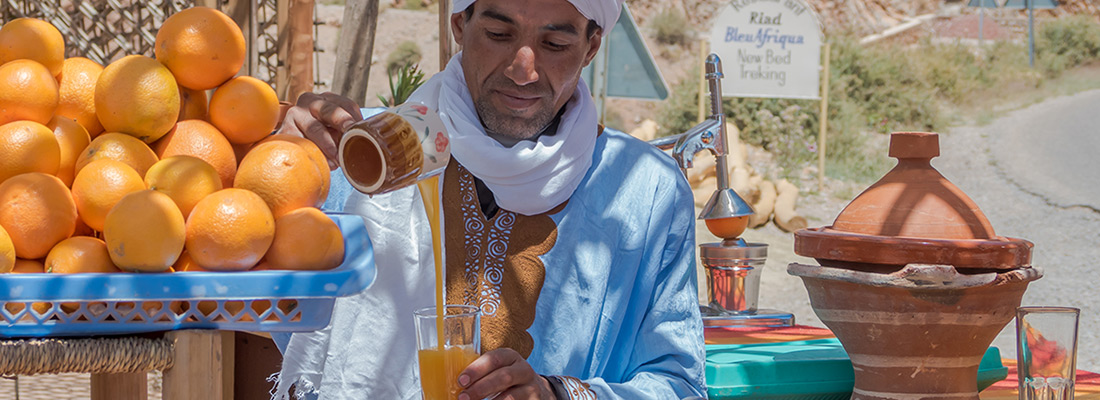
Click on the individual themes to show further information.
Many ECG companies are innovative, show that it’s possible to operate differently, transform the system every day and enrich our world with their activities.
For each of the 20 themes, that the ECG balance sheet sheds light on, motivating examples are illustrated here to inspire others. Of course the practices exemplified are representative of many other good examples, that do exist.
You can download Good Practice Brochure in the following languages:
Exemplary company practices for each matrix theme.
Added value with appreciation
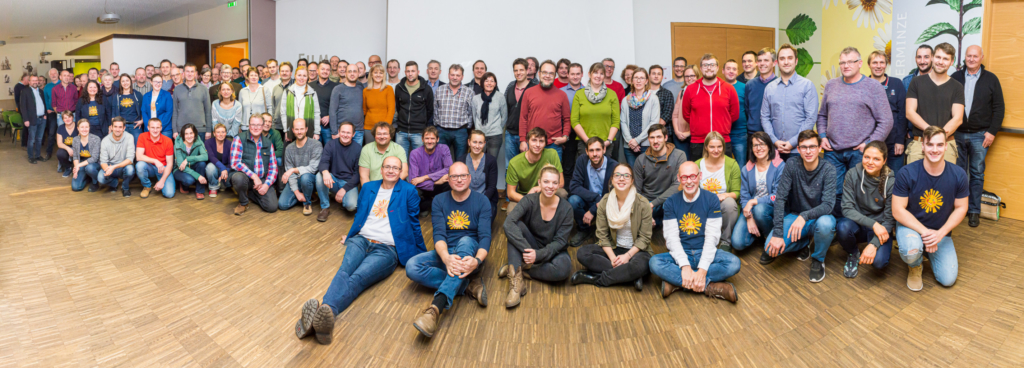
Annual cultivation meeting with organic farmers. © Sonnentor
Since 1988 SONNENTOR has been processing and selling organically produced herbs, which it obtains directly from farms, without intermediate trade and in respectful partnerships. Cultivation and supply contracts take local conditions into account, with guaranteed minimum prices above the market. SONNENTOR offers technical advice but also audits the production conditions. An annual cultivation meeting is held where farmers can connect and exchange. SONNENTOR also lives the principle of “direct trade” partnership with farmers in Africa and South America.
Read moreThe round table for grain
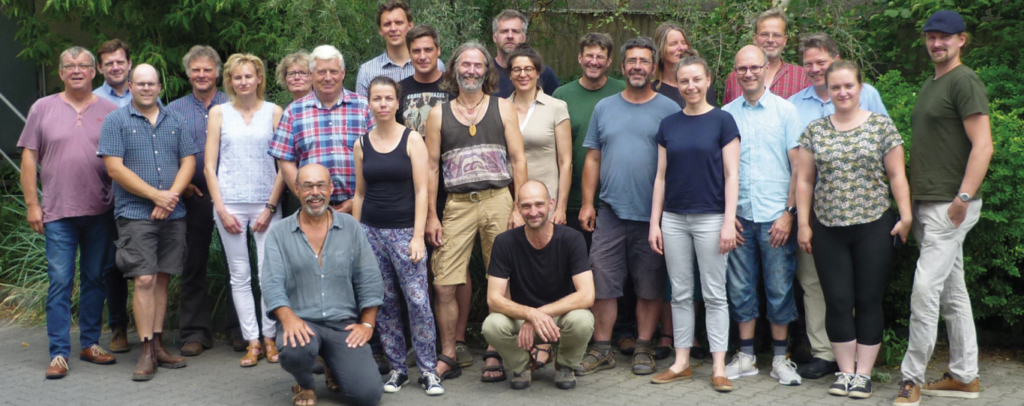
Round Table for Grain, 2019. © Märkisches Landbrot
Since 1992, Märkisches Landbrot has been a Demeter certified bakery and mill, buying its grain directly from regional farmers in Brandenburg, Germany and nearby Poland. At their annual Round Table for Grain all farmers producing grain for the bakery, as well as other Demeter bakeries if they wish, come together to negotiate expected harvest results and set the years’ prices – quite independent of the world market. If promises cannot be kept due to crop failures, for example, the group is called again to re-negotiate. At the end of the round table meeting, farmers vote anonymously on whether Märkisches Landbrot may use the “fair-trading & regional” partner logo.
Read moreThe Bausinger Sustainability Index
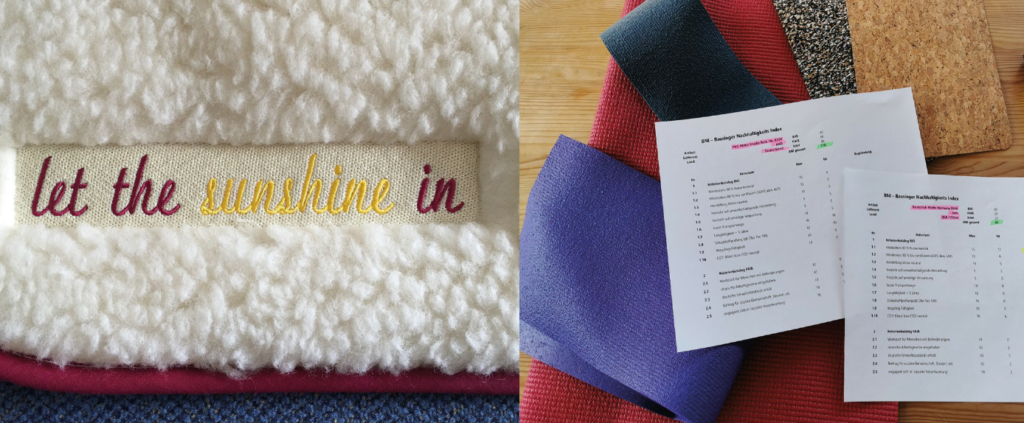
Rating according to Bausinger Sustainability Index (BNI). © Bausinger
The Bausinger company produces yoga mats made of new wool in the 3rd generation. Bausinger also sells merchandise which they systematically check to comply with the three company values: organic, fair and local. For each new article to be added to their portfolio, the so-called Bausinger Sustainability Index (BSI) is calculated in advance, i.e. the production history of an article is systematically researched and assessed using a list of a total of 38 sub-criteria and awarded points. The product is thus assigned a BSI total point value. Bausinger shares the information and assessments collected with its customers on its website and online shop.
Read moreSeed development with garden project
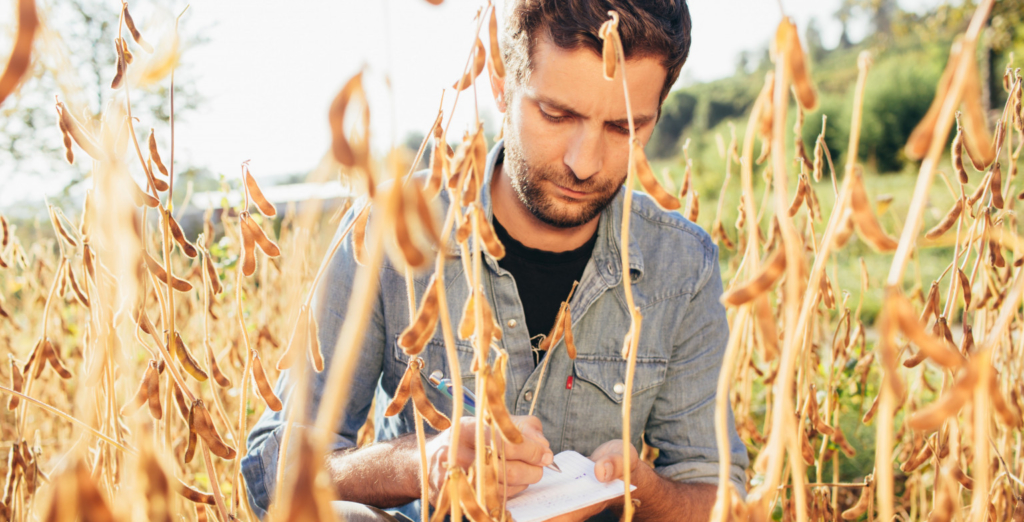
Soybean varieties free from patents for northern cultivation areas. © Taifun Tofu
Taifun-Tofu GmbH has been producing organic quality tofu specialties in south-west Germany for over 30 years and together with its soy producers in Europe it has long been committed to sustainable, GMO-free, regional soy cultivation. Taifun-Tofu and the State’s Seed Cultivation Institute of the University of Hohenheim, Germany have reached a landmark in seed development with an innovative method. More than 2,000 amateur gardeners and farmers across Germany participated in the cultivation of varieties of soy beans, leading to the cultivation of a few types that can be cultivated in cooler European climates – which was not possible until now. These varieties will be available without patents, a sustainable contribution to our future nutrition.
Read moreGuests share ownership
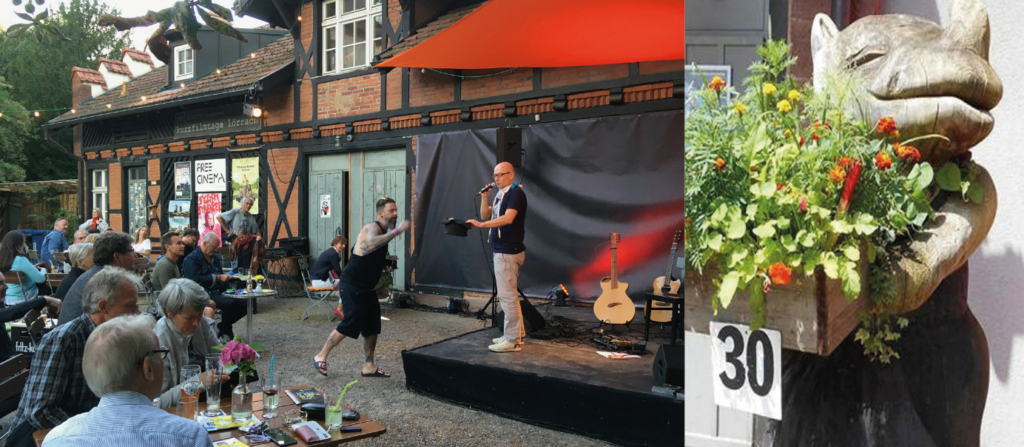
Co-owned socio-cultural meeting place. © Nellie Nashorn
The socio-cultural center Nellie Nashorn (Rhino) in southern Germany shows that even without making any profits, it is possible to successfully manage an organization oriented towards the common good. After the insolvency of the original association in 2015, the users of the cultural center themselves founded a non-profit limited liability company to ensure the center could continue. Thus, guests of the Nellie Rhino became co-owners, and through their far-reaching voluntary commitment also became co-workers and even suppliers of the socio-cultural center, thus enabling it to operate in the long term.
Read moreActive land policy
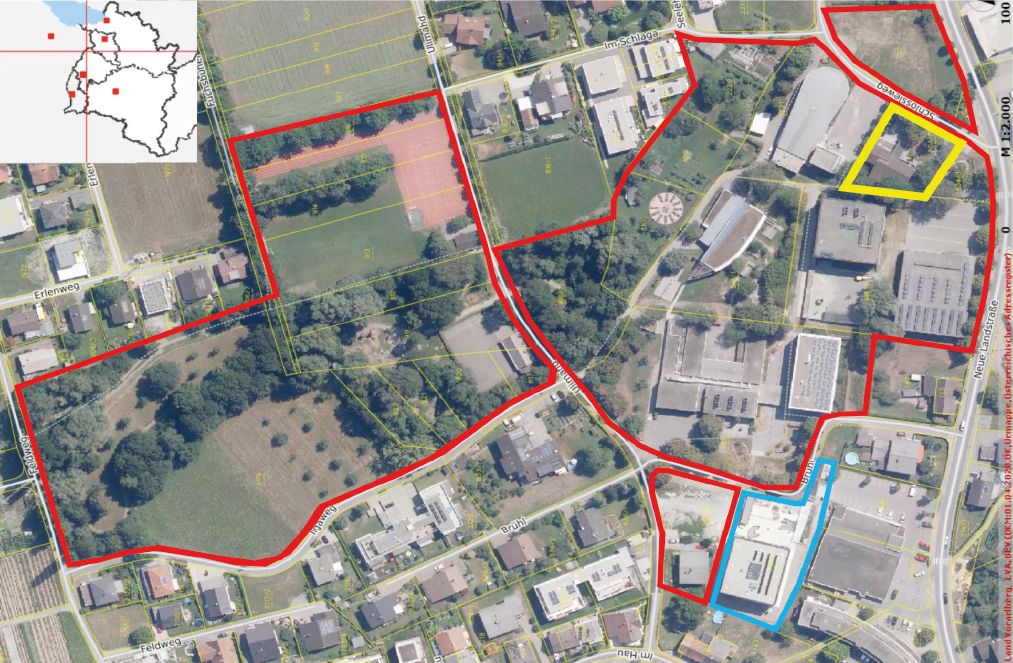
The land framed in yellow has always been owned by the municipality. In 1954 an elementary school was built there. Then, over the decades, land was purchased, and today all the plots framed in red are owned by the municipality. The municipality has 30 percent co-ownership of the plot framed in blue. © Municipality of Mäder
In 1978, the municipality of Mäder acquired a plot of land for the first time and designated it as a public green space. Since then, the growing municipality has set itself social and ecological development goals in its zoning plan and also designates many areas for municipal use that do not yet belong to the municipality. Over four decades, the municipality has steadily acquired land and built municipal infrastructure there – schools, kindergartens, social centers, affordable housing and, last but not least, green spaces. For the municipality, which is now experienced in land policy, land is a treasure that should not be sold, not even to pay off debt.
Read moreEcological yield
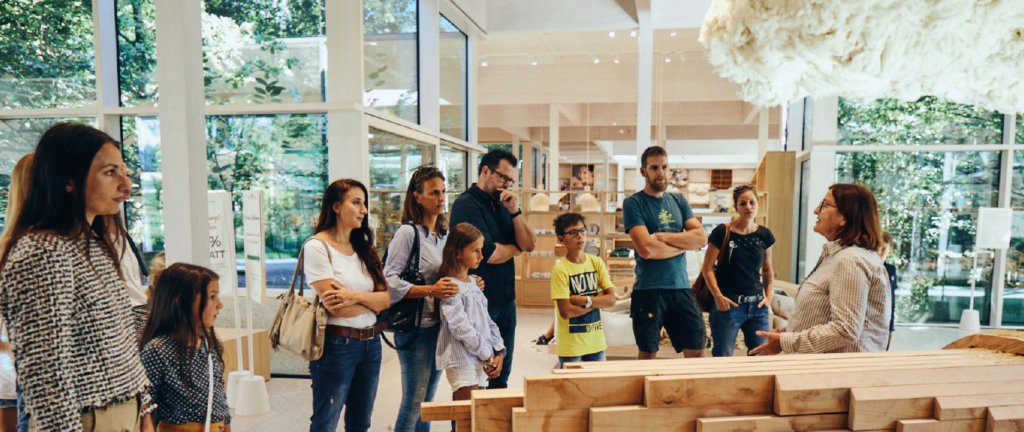
The ‘Grüne Erde Welt’ was built on an existing commercial site. Small, newly sealed areas were compensated with renaturation of another area. © Grüne Erde
Grüne Erde has sustainability goals and finances many investments independently of banks, giving priority to social and ecological aspects. All company-owned buildings have been ecologically renovated and annual investments are made in the expansion of electric mobility and photovoltaics. In the case of one rental property, Grüne Erde assumed the costs of a new wood chip heating system that the landlord could not afford. The new building in the Almtal Valley, the ‘Grüne Erde Welt’, which has won several awards, replaces rental properties with lower ecological standards. Grüne Erde also invests five percent of its profits in public welfare-oriented projects with no expectation of a return.
Read moreDemocratic corporate culture
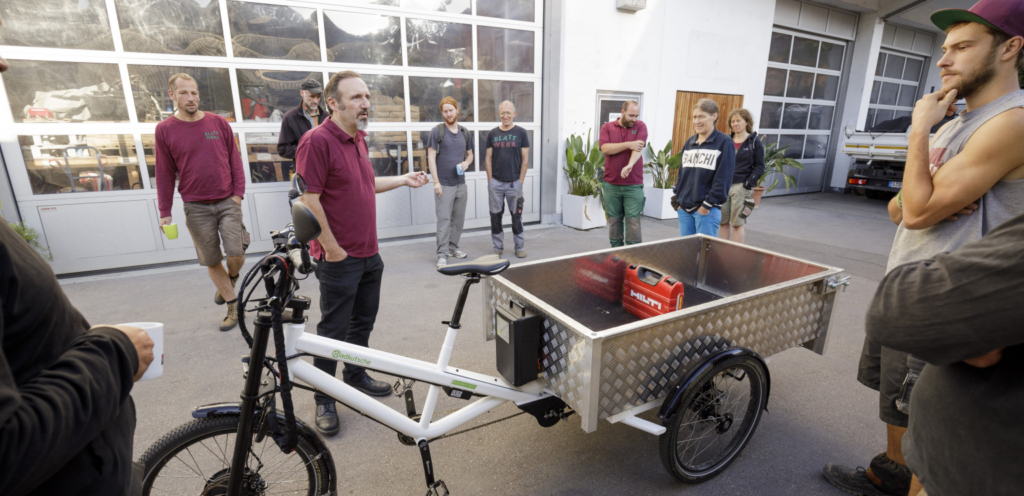
Operational decisions by consensus. © Blattwerk
When Blattwerk Gartengestaltung GmbH was founded in 1982, it was based on the idea of businesses being managed on basic democratic principles. Until the mid-1990s, employees were simultaneously shareholders. Then ownership differentiated as usual in mainstream business organizations. From the early days the practice of transparent and consensual decision making has prevailed. Notably, the company allows for internal deliberation on how profits are to be distributed between shareholders, employees and the company.
Read moreWorking time is lifetime
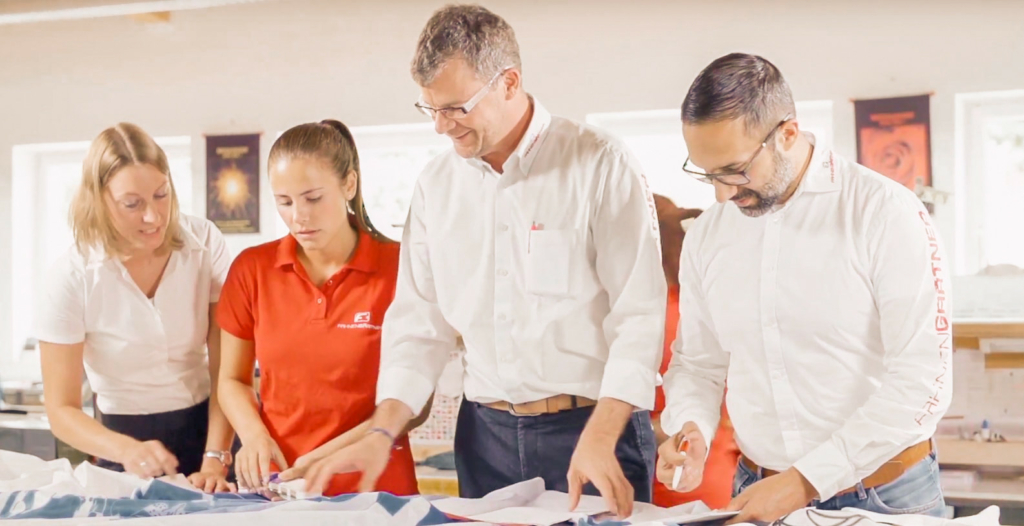
FAHNENGÄRTNER team at work together. © FAHNENGÄRTNER
FAHNENGÄRTNER has been manufacturing flags and advertising materials since 1945. The corporate culture of the Austrian family-owned company is characterized by meaningful jobs and a high degree of co-determination and self-organization of the workforce. The health program, which was initiated by employees and has won several awards, offers a company kindergarten and a regional company kitchen as well as a wide range of training opportunities and sports and health courses. The company also places great importance on equal opportunities. For example, 50 percent of management positions are held by women and 50 percent by men.
Read moreSharing, part-time, participation
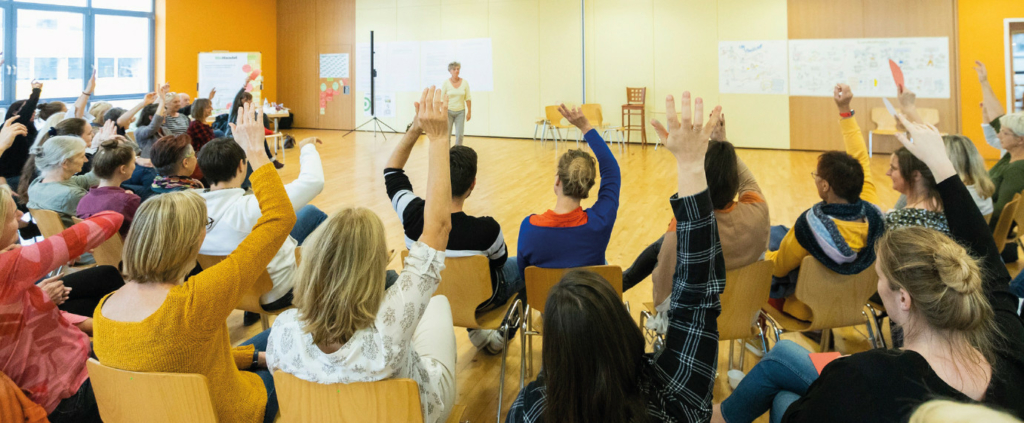
Employees have a stake in success, capital and decisions. © bio verlag
The publications of bio verlag gmbh are about sustainability and fair trade. Since 2011, bio verlag has also been formally employee-owned through capital and profit sharing. The advantages of shared responsibility are also evident in the way contracts are drawn up. Salaries are transparent for everyone and classifications are reviewed regularly. Employees can organize their weekly working hours flexibly, without core hours. For coordination in the teams, an attempt is made to meet all needs through constant exchange. Thanks to a balanced working time model, 70 percent of employees, including managers, work part-time with an average of 27 hours per week.
Read morePolitical orchard
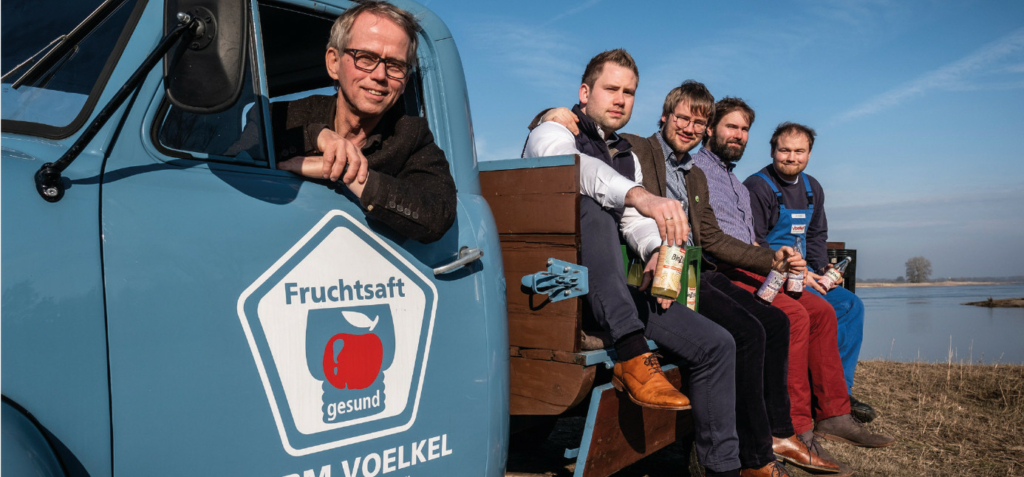
Stefan Voelkel with his four sons Jacob, Jurek, Boris and David Voelkel. © Voelkel
The first orchard of the organic juice producer Voelkel in the Wendland region in Northern Germany was cultivated according to anthroposophical principles a hundred years ago. In this way, the founding couple anchored in the family business an awareness of responsibility for people and nature that extends beyond the company. Voelkel’s management and employees are socially and politically involved in many ways. Employees have access to Demeter technical literature and further training. The company makes it possible for employees to eat one hundred percent organic food at work and at home. Only in terms of mobility can employees not behave in an exemplary sustainable manner – public transport is lacking.
Read moreWork on the work
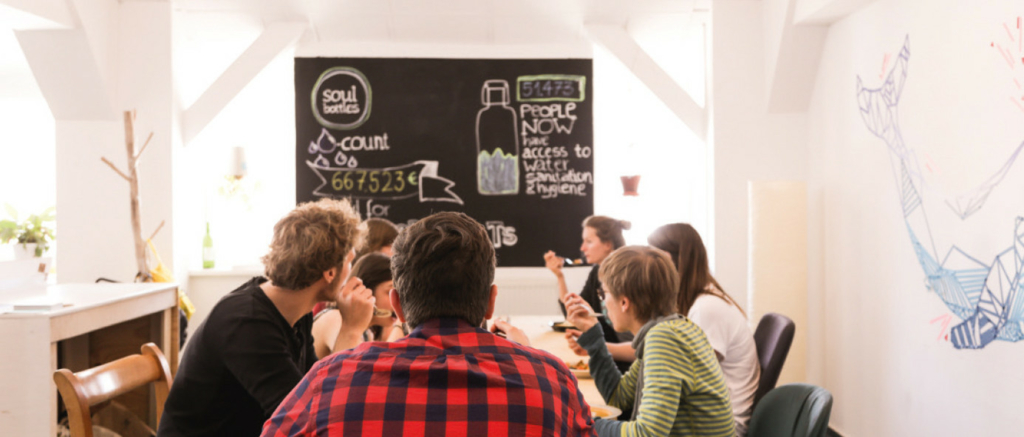
“We want to be able to show ourselves as a whole person, with everything there is, and still take our jobs really seriously and move things forward in a massive way.” © soulbottles
Since its founding in 2012, the young Berlin-based social enterprise soulbottles has brought one million plastic-free drinking bottles into the world. The company is owned by the employees themselves, who do not want to limit entrepreneurial leadership to just a few. They use the Holacracy form of organization, whereby all tasks are divided into roles that can always be redefined or filled. Operational development and the system of cooperation are shaped by the members through defined processes. All members are introduced to non-violent communication, so that appreciation, mediation and conflict resolution are part of the culture in the Soul universe.
Read moreFor a healthy hairdressing
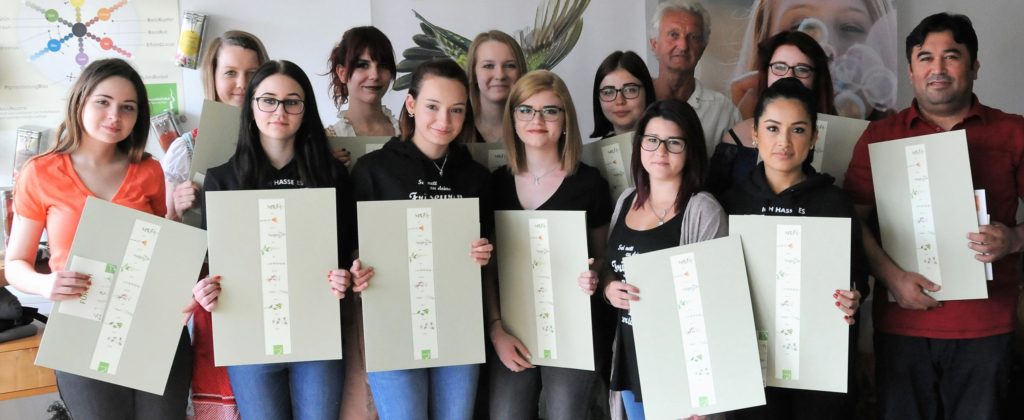
Willi Luger with alumni of the vocational training for ‘natural hairdressers’. © CulumNATURA
Out of concern for the health of hairdressers and their customers, Willi Luger, who is a hairdresser himself, has developed skin-friendly hair cosmetics made from natural products. Today his company CulumNATURA distributes the high quality products to small salons without the usual discounts for bulk purchasing or online trade, thus protecting his clients also economically. CulumNATURA has founded an academy enabling the training of hairdressers in the use of non-harmful products and promotes the recognition of hairdressing with natural products by the industry.
Read moreThe sustainable pearl bottle
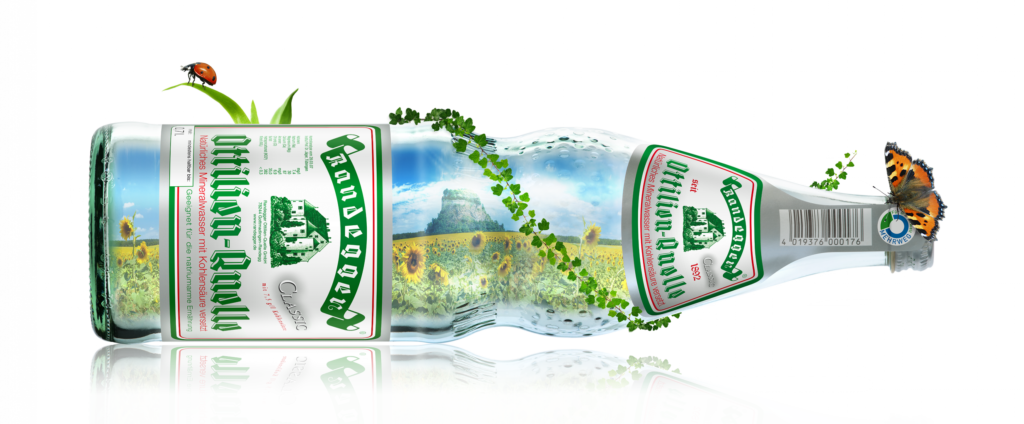
The pearl bottle — a bottle design of fifty years. © Randegger Ottilien-Quelle
Randegger Ottilienquelle has been using the same bottle design for 50 years for its mineral water, the “pearl bottle”. In 1969, 200 bottlers of mineral water developed this design together under the umbrella of the Cooperative Deutscher Brunnen. This bottle has been proven an ecological and economic success for half a century: bottlers only need to add their own labels, and consumers recognize the mineral water quality by the bottle design while automatically participating in Europe’s largest reusable botteling system.
Read moreGreen electronics
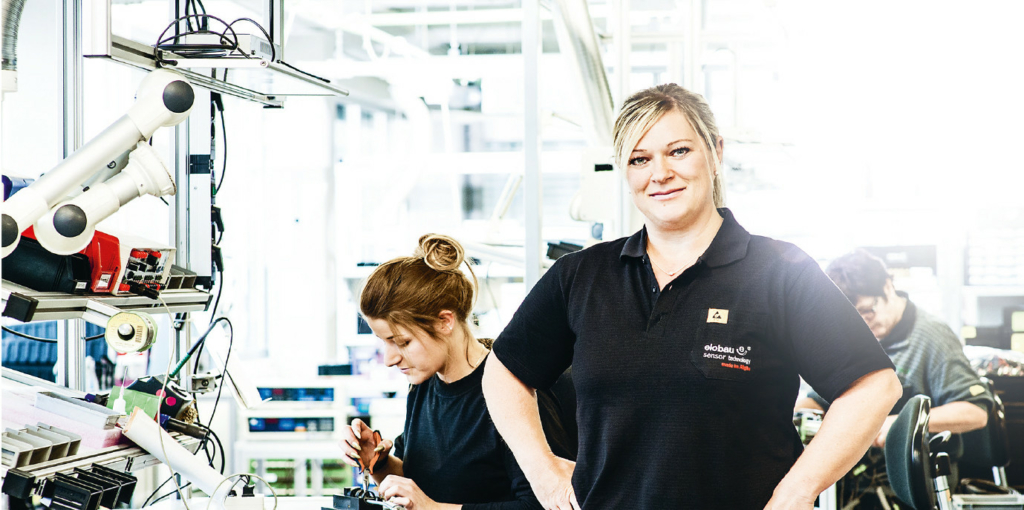
elobau deliberately avoids all hazardous and toxic substances in its products. © elobau
The internationally active ensian group produces non-contact sensor technology for commercial vehicles, machine safety and level measurement under the brand name elobau. It is represented in 38 countries and has around 950 employees worldwide. Due to high vertical integration, the products are produced at the site. elobau systematically pays attention to developing durable modular products with repairable and replaceable individual parts and keeping materials separable to make later recycling uncomplicated. In 2019, the industry’s first control console made of apple leather and approximately 70 percent petroleum-free plastics was produced in cooperation with researchers.
Read moreLights on for transparency
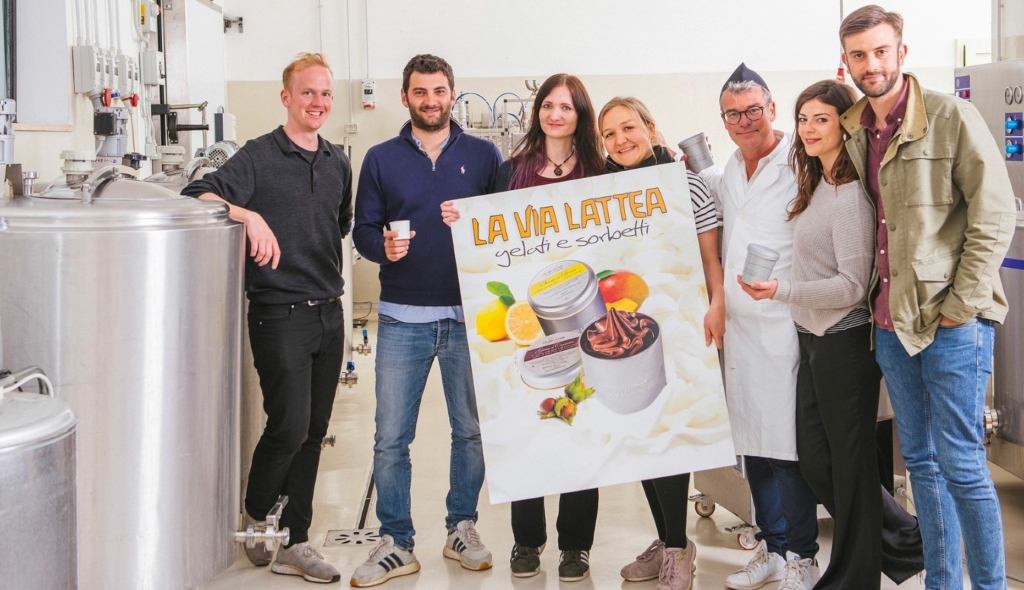
As part of the transparency initiative, two Ökofrost employees visit the ice cream producer La Via Lattea. © Ökofrost
Ökofrost has been a specialist wholesaler for organic frozen foods since 1996. With the transparency initiative ‘Full Understanding’, the company invites customers to take a closer look at the manufacturing processes of the Biopolar products, an Ökofrost brand. A specialized website offers a systematic report on social and ecological aspects and animal welfare for each product. Ökofrost deliberately does not shy away from the dark sides of organic production, e.g. the disclosure of corporate structures in the organic sector. The aim of the elaborate transparency initiative is to create appreciation and awareness for the products purchased and the organic foods sector itself.
Read moreMore value for people
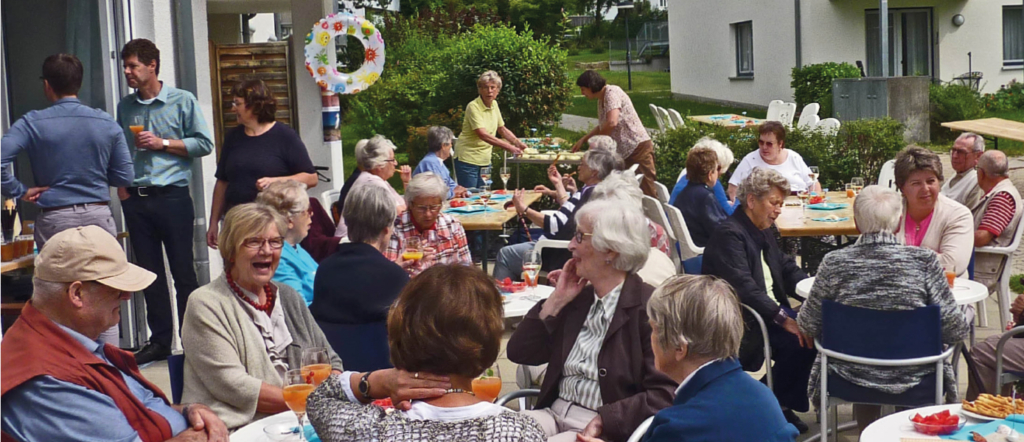
Inclusion in the neighborhood. © Samariterstiftung
The church-based Samaritan Foundation and its ten associated subsidiaries in Württemberg in Southern Germany provide support for 4,000 people in the areas of care for the elderly, care for people with disabilities and social psychiatry. The aim is to enable people who are discriminated against in the economic system to enjoy dignified living conditions. Through educational work, the social destigmatization of mental crises and illnesses is to be achieved. The services offered by the facilities are actively integrated into the respective neighborhoods. New concepts of inclusive community work are also under development.
Read moreProfits for the common good
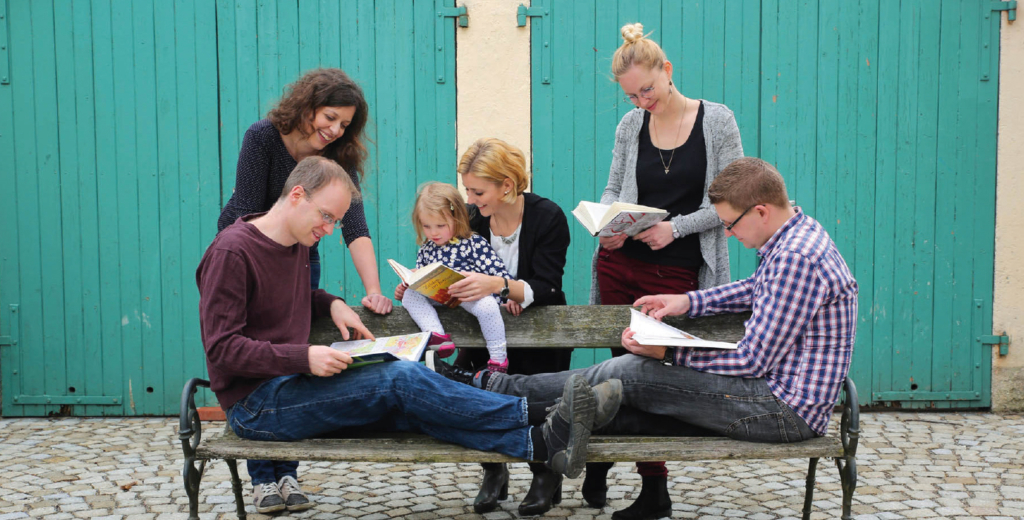
Hobby, work and family time – the buch7 team. © buch7
With the aim of donating a large part of the profits to ecological, social and cultural causes, the online book company buch7 was founded as a limited liability company in 2008. In the beginning, the founders worked for free, so that half of the first profits were donated. After a long build-up phase, the breakthrough came in 2013, as a result of a high-profile documentary about working conditions at Amazon.
Today, buch7 is a company with nine employees, over two million euros in sales and a cumulative donation of over 500,000 euros, which corresponds to about 75 percent of profits. Donations are made unbureaucratically to small projects.
Swimming by numbers
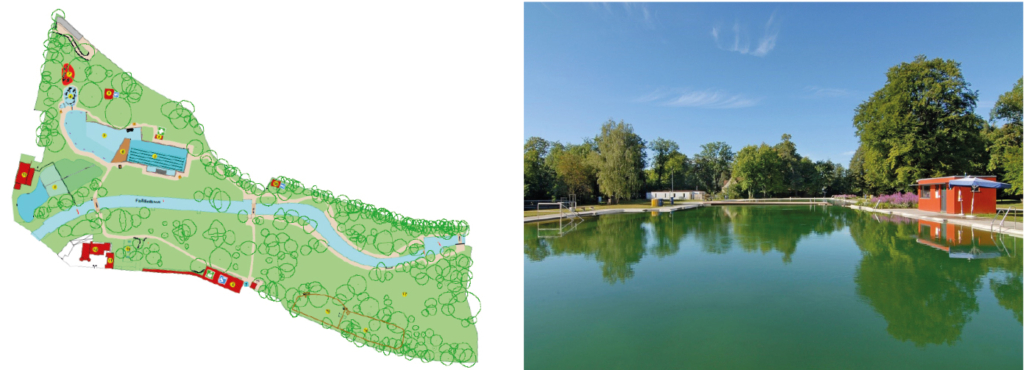
In the Maria-Einsiedel natural swimming pool, the swimming water in the separately constructed regeneration pond is purified in a purely biological and mechanical manner. As clean, soft water, the swimming water flows back into the swimming and children’s pond. © Münchner Bäder
At 16 locations, guests at Munich’s pools have a wide range of options for keeping healthy and spending their leisure time. Ecological damage caused by the operation of the pools is primarily due to water and energy consumption. With the introduction of an environmental management system in accordance with EMAS regulations in 2006, strategic and annual environmental protection goals, translated into key figures, were able to set the direction in all areas of the company. In conjunction with team targets and performance-based compensation, the process of change throughout the company is having a measurable impact: For example, water consumption has been reduced from over one million cubic meters before 2012 to 650,000 currently.
Read moreCitizens against genetic engineering
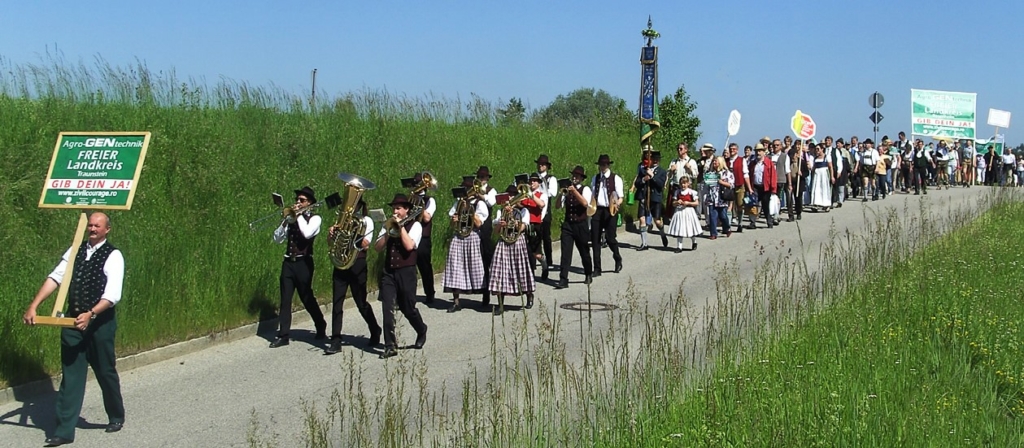
Demonstration march of the initiative ‘Zivilcourage gegen Gentechnik’ (civil courage against genetic engineering), 2008, Rosenheim, Germany. © Initiative Zivilcourage gegen Gentechnik
The family business EM-Chiemgau has been developing effective microorganisms for agriculture for 25 years. Together with 40 farmers, director Christoph Fischer founded the initiative ‘Zivilcourage’ (Civil Courage) in 2006 to inform about the dangers of agro-genetic engineering. Thanks to large mobilization, they managed to rally a majority of farmers and other bavarian citizens behind them demanding a ban on the cultivation of genetically modified maize. As a direct consequence, the Federal Ministry of Agriculture finally – and reluctantly – endorsed the landmark ban in 2009, which is still valid today.
Read moreA1 Human dignity in the supply chain
SONNENTOR
Added value with appreciation
The Waldviertel in Lower Austria is part of the Bohemian Massif, a granite and gneiss highland with less fertile soils and a rugged and cool climate. Anyone who was born and grew up here, like Johannes Gutmann, the founder of SONNENTOR, knows that little grows here and that one must constantly defy the wind and soil erosion. But the Waldviertel is ideal for growing herbs. The slow growth is even an advantage for plants like herbs, whose aromatic and flavorsome qualities are released when you grind the leaves or crush the seeds. Johannes Gutmann recognized this and saw in it the chance to build a sustainable and beneficial livelihood in his home region.
In 1988, and unemployed, he founded SONNENTOR. Gutmann was able to forge an alliance with three organic farming families Kainz, Bauer and Zach as his first suppliers. “We started with peppermint, chamomile, nettle, cheese poplar, lemon balm, sage and six herbal tea blends. Each of the three farming families supplied two individual herbs and two mixtures. I was responsible for organization, transport and marketing. All of them could contribute to the success of the whole thing according to their talent and ability. For me, this was face to face cooperation. That’s how added value was created with appreciation,” Johannes Gutmann describes his beginnings in the Waldviertel.
While in 1988 there were only three Waldviertel organic farms, there are now 300 Austrian organic farming families, mainly from Lower Austria and Upper Austria as well as Burgenland, who supply SONNENTOR. They all receive a cultivation and supply contract in which the area under cultivation and the expected supply yield for the respective raw material are fixed. The pricing is always fair, the same for everyone and above the usual market price. Each year in January the annual cultivation meeting takes place at the company’s location in Sprögnitz and partners come together to present current projects and share knowledge and experience.
Before the cultivation meeting, the cultivation planning is carried out together with SONNENTOR over the winter. Consideration is given to which organic farm can and wants to cultivate which plant best. SONNENTOR is in constant professional exchange with its suppliers throughout the season and visits farms providing advice and support. Regular audits are carried out by the company’s employees on the organic farms. For example, harvest management and the handling of herbs are discussed together and the packaging rooms are checked for compliance with hygiene standards.
As a reaction to the decision of the EU Commission in November 2017 to allow the use of glyphosate for a further five years, Johannes Gutmann, together with farmers in the organic sector, launched the international campaign ‘Poisoned fields? – No thanks!’ and co-founded the Alliance for Regenerative Agriculture for Future Generations. Gutmann then took the initiative to Austria, where, together with the organic farmers of the SONNENTOR family, he set up his own association to promote an ‘Environment fit for Grandchildren’. Each of them gives a small part of their proceeds as a solidarity contribution, which enables the association to support individual organic farms if pesticide use in neighboring fields causes damage and quality defects in the fields.
Today, SONNENTOR is an international company that nevertheless receives a large part of its raw materials directly from small organic farms and implements the principle of fair and solidarity-based trading. In addition to Austria and the neighboring countries Czech Republic, Germany and Italy, there are other growing areas in South-Eastern Europe and on the Iberian Peninsula. SONNENTOR is also active in Africa (Tanzania) and South America (Peru and Nicaragua). There, too, the company cultivates long-term partnerships characterized by personal visits and relationships without intermediate trade, so-called direct trade and with guaranteed minimum prices. Organic farming methods and harvesting by hand also ensure that the added value remains on site, strengthening the natural conditions for long-term, fruitful harvests.
In cooperation with the Austrian Agency for Development Cooperation, an organic coffee project was launched in the mountains of Jinotega in Nicaragua in 2012. Agreed fixed prices guarantee coffee growers security that makes them independent of fluctuating world market prices. SONNENTOR only purchases Arabica beans from traditional shade cultivation. The cultivation of the coffee plants, under larger trees of natural vegetation, promotes biodiversity and ensures not only good harvests but also better protection against erosion and higher soil fertility.
Johannes Gutmann is convinced “that all of us in this world can feed ourselves sustainably and organically if we follow and respect natural life cycles”.
A2 Solidarity and social justice in the supply chain
Märkisches Landbrot
The round table for grain
Märkisches Landbrot is a bakery and mill based in Berlin, Germany. Its mill business is part of the Berlin-Brandenburg Mill Association and its bakery has been Demeter certified (certified as biodynamic) since 1992. The mills produce 75% of the grain they process into whole meal grist and flour every day. This approach enables the bakery to purchase the grain directly from farmers, which means there is total transparency about the provenance of the grain in their supply chain.
Localized production is key to their business. They try to source as much as possible from farms near their base in Brandenburg. If they need to go further afield for resources, in case of less than expected yield or quality, farms from Saxony and then the Demeter partner farm from Juchowo on the Polish border will be included. Only when the demand for grain from local farmers cannot be met will they seek replacements from outside their state.
The company keeps a close relationship with their suppliers. By visiting the farms, they source from annually, they are able to keep up to date on the strengths and challenges their suppliers have. One supplier, Heike Böthig from Gut Peetzig, agrees that this allows a ‘close and trusting relationship’, one which allows them to cooperate easily.
All of Märkisches Landbrot’s suppliers take part in what is known as a ‘Round Table for Grain’ every year. This forum allows bakers and farmers to discuss grain quality and harvest yields, and this affords a mutually beneficial working relationship. This forum is also open to all other Demeter bakeries, demonstrating their cooperative and democratic business practices at work.
In 2009, at that year’s Round Table, it was jointly decided that the businesses present would make themselves independent of world market prices for their grain. This decision was taken as they saw the ‘free market’ failing in its job to accurately decide the price for their products, and this in turn was letting down both the agricultural businesses but also the consumers, the bakeries. The framework they decided on was fixed prices for rye, wheat and spelt. These prices have ensured a fair income for the farms, but also affordable prices for raw materials available for the bakeries to purchase. These benefits are enjoyed by the final consumer: the stable prices mean more people can buy their high-quality product. In the absence of an effective ‘free market’, the Round Table forum has provided an equilibrium to the benefit of all stakeholders.
Since that pioneering decision in 2009, the farmers have cooperated in setting prices at the Round Table. If one party feels these prices are unworkable, the Round Table is convened and terms are renegotiated. This trust means that even if external factors (e.g. crop failures) affect the pricing equilibrium, all parties at the Round Table can negotiate to find a way forward. This relationship prioritizes binding cooperation; instead of short-term, one-sided profits, there are long-term benefits for all. A vote after each round of negotiations settles whether the agreed terms are fair, and if individual businesses (like Märkisches Landbrot) can use the logo, showing that they are a fair-trading regional partner.
On the Märkisches Landbrot website you can read a summary of the negotiations, as well as the fixed prices each year. This gives consumers an insight into how their supply of bread is connected to the region’s agriculture, something so easily taken for granted. This information also shows consumers the existential influences on these local farms, from the wages they pay the workers, the increase in lease payments, and the changing environment, such as recent periods of drought. Consumers can understand that these fair-trading methods are vital for the continuation of sustainable farming methods. As a vindication of these policies, the traditional, site-appropriate rye-varieties from these Demeter farms are favored by attendees at the Round Table for Grain.
The pricing equilibrium guaranteed at the Round Table not only means the farms and farmers are secure to work well and live comfortably, but also means Märkisches Landbrot secures the highest grain qualities on the market. It also ensures an extraordinary security of supply when buying grain. With the transparency in its pricing policy, Märkisches Landbrot wants to contribute to the sustainable development of organic and biodynamic agriculture.
Many of the farmers supplying Märkisches Landbrot have co-signed the Fair & Regional Charter. In the meantime, the initiative has become known beyond regional borders and is considered a model for sustainable management. Heike Böthig from Gut Peetzig is on the board of the Märkische Wirtschaftverbund, and said:
‘My wish is that the open, friendly and honest relationship that exists between us and Märkisches Landbrot will also find its way into other value chains. And we are on a good path. More and more ‘round tables’ are being set up where farmers, milliners and producers can meet to discuss their supply relationships and reasonable prices in a transparent and increasingly trusting manner.’
Such is the success of the Round Table model, in Saxony, an initiative based on the one in Brandenburg has already been launched.
A3 Environmental sustainability in the supply chain
Bausinger Yoga Manufacture
and the Bausinger Sustainability Index (BSI)
In 1975 Frieder Bausinger, yoga teacher and textile engineer from Reutlingen, Germany, was asked if it was possible to create a warm and body-friendly, yet non-slip yoga mat. He developed the first new wool mat with a latex underside, the original model of today’s new wool mats. Bausinger was founded in 1977. Today the Bausinger yoga factory is in its third generation of entrepreneurs.
In addition to the production of yoga mats made of virgin wool and other materials, a large part of its product range is manufactured in Germany. In addition, the range is supplemented by merchandise. In the selection of these products and service providers, Bausinger tries – as best it can and as humanly possible – to adhere to the three company values BIO, FAIR and NEAR. For each new article to be added to the product range, the Bausinger Sustainability Index (BSI) is calculated in advance, i.e. the production history of an article is systematically assessed using a list of a total of 38 sub-criteria and awarded points. The product is thus assigned a BSI total point value. All purchased products and services should meet these criteria as closely as possible and must meet at least 150 points from all criteria.
In order to calculate the BSI, Bausinger researches the production processes and the supply chain behind them, and has already come up with astonishing results – as in the following example, the comparison between yoga mats made of natural rubber or PVC:
Normally, Bausinger prefers product alternatives made from natural raw materials. Yoga mats made of natural rubber are also very popular because of their slip resistance. However, research revealed that 80 percent of the world’s natural rubber is produced in monocultures on rubber plantations in Malaysia and Indonesia, with high use of insecticides and pesticides, soil degradation and above-average erosion during monsoon rains. Many plantation workers have health problems due to the sprays used. The vulcanization of rubber produces nitrosamines which are suspected to be carcinogenic.
In addition, natural latex easily crumbles under UV radiation. With the addition of acrylates and plasticizers, the life and service life is extended, but the plasticizer evaporates over time (hence the typical sour smell of natural rubber products). According to Bausinger’s research, natural rubber mats contain about 30 percent acrylates and plasticizers as well as a glass fiber fabric (PES fabric). The processing is mainly done in China and Taiwan. The transport costs alone and the consumption of resources for the processing of raw and intermediate materials are immense. In addition, the durability and service life of a rubber mat is quite limited at around one to three years.
In comparison, a PVC yoga mat produced in the Swabian Alps does surprisingly well. Although the raw materials are based on crude oil, expenses for transport and intermediate processing are significantly reduced. In addition, the service life of a PVC yoga mat is significantly longer at six to ten years. One manufacturer even generates 80 percent of its energy input with solar power. The yoga mats are tested for harmful substances according to Öko Tex 100 and have the rating ‘suitable for babies or soothers’. This certainly puts the usual grubby image of these plastic mats into perspective.
Bausinger has calculated a BSI of 81 out of 300 possible points for the rubber mat. A PVC yoga mat manufactured in Germany, on the other hand, scores 170 out of 300 points. The company is currently working on a recycling program and closed-loop process for PVC yoga mats.
As a consequence, Bausinger has not yet eliminated the natural rubber mats from its range of products due to the lack of genuine alternatives, but does not actively advertise them and does not offer them to customers in particular — especially with reference to their limited durability.
The company communicates the knowledge gained in the course of calculating the BSI to visitors as part of the product description on its website. These raise awareness with customers of their responsibility in the process and create an interest in better understanding the supply chains of our consumer goods, which are often taken for granted.
A4 Transparency and co-determination in the supply chain
Taifun-Tofu
Seed development with garden project
Taifun-Tofu GmbH has been producing organic quality tofu specialties in south-west Germany for over thirty years and has long been committed to sustainable and GMO-free soy cultivation and a future-orientated diet. In order to strengthen regional soy cultivation, the company is breeding new soy varieties for cultivation in Germany together with the University of Hohenheim, Germany.
Soy has a poor environmental footprint in the conventional food chain because it is primarily imported into Germany from the USA, Brazil and Argentina as industrially grown animal feed. Neither the long transport routes, nor the clearing of species-rich rain forests, for which soybean cultivation is one of the main drivers, are environmentally justifiable. In Germany, Taifun-Tofu has been looking for new ways to make the cultivation of soy organic, transparent, fair, regional and GMO-free in organic quality.
The focus is on soybeans for tofu production. “Soy from Germany reduces transport routes and ensures a sustainable supply of vegetable proteins. Soy as a “fodder plant” for humans is the most efficient way of a full protein supply, because soy protein has a high nutritional value. In addition, it does not require any fertilizer and enriches crop rotation,” explains Wolfgang Heck, co-founder and managing director of Taifun-Tofu GmbH and chairman of the Heck Foundation.
At the end of the 1990s, Taifun-Tofu launched organic soybean cultivation in Germany in co-operation with local farmers.
Taifun-Tofu and its suppliers cultivate long-term and fair partnerships within the framework of contract farming. The employees of the company’s own center personally accompany and advise the soy producers throughout the entire growing year and provide them with high-quality seeds from their own production.
Taifun-Tofu also makes a wealth of information about soybean cultivation publicly available on the Soy Promotion Ring website.
During the annual “Soy Round Table”, the farmers are also given first-hand insights by the management into what is happening in the most important markets, investments and other challenges.
This also provides an opportunity to exchange views on the challenges of the past and coming growing year and on the development of the soybean price. The price is set fairly and appropriately by Taifun and communicated transparently to the contract partners – even before sowing. If the quality is good enough, Taifun takes over the entire quantity of the previously agreed area. This offers farmers economic security.
Taifun-Tofu has helped to initiate a significant innovation in soybean cultivation through seed development. Historically, soybeans for tofu production were successfully cultivated in Europe mainly along in the southern regions of Baden and the Palatinate, Germany. There have been no suitable varieties for other regions. In the search for soybeans that also grow in colder regions, the company is working with the State Seed Breeding Institute of the University of Hohenheim, Germany and other partners.
For the 2016 and 2018 growing years, Taifun and the University of Hohenheim called on interested gardeners and farmers to participate in the innovative ‘1,000 Gardens’ soybean seed project. More than 3,000 amateurs, community and school gardeners and farmers throughout Germany who were eager to experiment signed up to participate in the ‘1,000 Gardens’ project. For the scientists, this was a unique opportunity to test numerous soybean crosses at different locations throughout Germany. Gardeners received twelve seed bags with different soy strains. Observations were entered into a database and samples from the harvest sent to the University for analysis. The company provided interpretative materials for community and public gardens, to gain public interest and support. The media were also very interested.
Finally, Taifun-Tofu tested the samples in its own laboratory to evaluate whether they were suitable for more widespread tofu production. Promising hybrids are being further developed by the University of Hohenheim and other breeders. The resulting varieties are patent-free, which makes them independent of the global seed monopolies.
In the cultivation test of ‘1,000 gardens’ was also a very advanced hybrid, which has now (2019) been approved as the first Taifun-Tofu own variety: the “Tofina”. Numerous contract farmers are already growing this new, climate-adapted variety for Taifun. In spring 2022, the ‘1,000 gardens’ project will enter its third round.
B1 Ethical position in relation to financial resources
Nellie Nashorn
Guests share ownership
The socio-cultural center Nellie Nashorn has existed since 1986, initiated partly by graduates of a teacher training college in Lörrach. The cultural center was managed by the association “Nonetheless e.V.”, until it became insolvent in 2015 after many ups and downs.
Immediately, Nellie’s many enthusiastic supporters formed an association, which raised funds to set up a new company, which continues to run the center.
This supporting association – Freunde des Nellie Nashorn – currently has over 120 members from Lörrach’s population, who together hold the 25.000 Euros of share capital. Based on this new approach of local funding for a non-profit social enterprise, the Nellie Nashorn has blossomed anew.
Nellie Nashorn is a meeting place for people from all walks of life. The center acts as organizer, networker, project developer and supporter for people from Lörrach and the surrounding region. Inclusive services include a varied cultural program, and rooms for activities of different groups, associations and initiatives. It invites community groups and guests to exchange ideas, develop them and put them into practice.
The premises in the historic Flachsländerhof, an 19th century manor house in municipal ownership offers seminar rooms and a simple café with a mostly vegetarian menu, as well as a small stage. In one of the two outbuildings there is a theatre hall with foyer and bar, which can also be used for workshops, lectures, music and dance events. A wide ranging cultural program includes cabaret and comedy, music (singer-songwriter, folk, world music) and theatre. National and international artists are presented, along with up-and-coming local artists given the opportunity to perform in a professional setting.
The other outbuilding is rented to the free cinema, the only cinema in Germany run by young people on a voluntary basis.
The cultural center is run as a non-profit, but strives to work sustainably for the benefit of the community. As a non-profit limited liability company, all funds generated are re-invested in the center. The owners do not expect any interest on their deposits. Their contribution enables the work of the socio-cultural center to be sustained in the long term. Neither distribution of profit shares nor new debts are envisaged in the concept of the house.
The owner “Friends of the Nellie Nashorn” has decided against a more conventional and commercial marketing strategy
- Guests pay a voluntary donation instead of a fixed entrance fee for the majority of the events.
- Civic initiatives can rent the rooms at a very reasonable price.
- The premises are also rented out at fair rates for events, celebrations or seminars.
For day-to-day operations, the center receives significant subsidies from the public sector, namely the city of Lörrach (112,500 euros in 2017) and the state of Baden-Württemberg (58,750 euros), which means that Nellie Nashorn roughly doubles its own income from donations, catering, rentals and admissions.
Fair payment of employees and artists is a priority. Finally, the aging technology in the theatre hall must be renewed as a matter of priority and the reserves strengthened. In the course of the renovation, the management and the leadership of the organization were newly appointed in order to have experts for these two important positions – as a basis for the development of a socio-cultural center in Lörrach which is now both solidly financed by the users and economically sound.
B2 Social position in relation to financial resources
Municipality of Mäder
Active land policy
Mäder is the most densely populated municipality in Vorarlberg, whose population has risen continuously since 1950 from under 800 to over 4,000 people today. Two guiding principles were defined years ago that continue to shape the municipality’s political actions today: “Mäder should remain a village” and “We want to become an environmental model municipality”. To remain a village means that residents can use public spaces where social gatherings are possible for everyone. To this end, the municipality has purposefully increased publicly-owned spaces and created public infrastructure there.
The municipality of Mäder has shown that it is possible for a town to be actively involved in land policy by using capital for land acquisition over four decades. Some acquired land has also been exchanged for other land in order to realize sustainable land use planning. A key tool for the municipality is the zoning plan. In this, areas were designated for municipal use even though they were not yet owned by the municipality. Through this planning, it was always clear to all those responsible what focus they must have in their efforts to achieve the social and ecological development goals of the municipality. And the result proves them right. In the 1978 zoning plan, the “Brühl” area in the center of the municipality was designated as a public green space, which the municipality had not yet owned. Since then, the municipality has successfully tried to acquire land in this area. Over the years, an area of 3.25 hectares of public green space in the center of the community could be secured for the future.
Furthermore, with the acquisition of the “Wehinger-Gründe”, about 0.4 hectares, the spatial conditions for assisted living and later also a social center could be created. The zoning plan provides for a kindergarten in the Waul district. Therefore, land in this area was acquired by the municipality. Through the active land policy, the municipality has also become the owner of an additional 1.3 hectares there in the center of the village.
In an open planning process, the citizens of Mäder were invited to help shape this future quarter. A residential area with about 70 residential units was planned, which are to be built partly as rental apartments, partly as condominiums, in an affordable price segment. About 1/3 of the area is to remain in municipal ownership as public open and green space. Two further development areas for affordable housing and also commerce are now in the implementation planning stage.
As the owner of large parts of these areas, the municipality can significantly influence the balance between private use and publicly accessible areas. The Spatial Development Concept, developed in 2010 together with the population, describes the reservation of areas to public green space, which is necessary for the positive development of the municipality. The aspiration of the municipality is also to add these areas to public ownership.
In addition to land planning, the municipality of Mäder successfully applies other instruments for its active land policy. On the basis of annuity contracts, the municipality purchases properties, while the owners retain lifelong residential rights in the respective house. Mayor Siegele likes to talk about how well this solution is received: “The municipality expands its scope for action and the homeowners are happy to no longer be responsible for the maintenance of the house. It is important for the municipality to be known as a land buyer with a good credit rating and fair, market-oriented prices. When acquiring land for construction, the municipality offers the sellers an improvement in the event of conversion to building land within a ten-year period. For example, after two years 80 percent of the difference and after nine years ten percent of the difference between the sales price and the market value will be rectified.
It is also noteworthy that the municipality of Mäder does not sell its land to pay off debts. It would be very easy for the municipality of Mäder to become debt-free by selling only a part of the land assets that are not absolutely necessary for public development. There is a consensus in the city council that active land policy is necessary for prosperous municipal development. Accordingly, recent land transactions have all been unanimous. “There was once a time when people were ashamed to be Mäderers because of poverty,” says Helmut Giesinger, head of the municipality’s office. Today, a new mentality has taken hold. For example, the residents can actively get involved to help decide which direction the community should develop. Over forty years of forward-looking acquisition of land with clear social and ecological goals have opened up this creative space for the community. Active land policy takes time. It is a project over generations.
B3 Use of funds in relation to social and environmental impacts
Grüne Erde
Ecological yield
The company Grüne Erde has been producing and trading high-quality, ecological products with the most timeless design and durable quality possible for 36 years. It sells over 6,000 individual products which are distributed individually, by mail order and through 14 retail stores in Austria and Germany. The turnover of goods in the fiscal year 2018/2019 was about 57.4 million euros with an annual result for the entire Grüne Erde Group of 2.7 million euros.
The company, whose actions “serve people and nature,” aims to grow organically – with two to three percent price growth and six to seven percent volume growth each year. However, more extensive investments to achieve the ambitious sustainability goals require outside capital. The company can finance the largest share of its investments through so-called subordinated loans. Since 2013, around 3,000 customers have granted loans to Grüne Erde amounting initially to 1.3 million euros, and today to 15 million euros. In 2013, the company was confronted with increased loan security demands from banks.
Grüne Erde did not want the banks to take away its sovereignty over its own brand, investment decisions and the protection of customer data. Protecting the approximately 2.3 million customer addresses is a high priority for Grüne Erde – the company therefore also withdrew from social media at the beginning of 2015. In May 2013, Grüne Erde launched a call for loans to customers and has since financed itself independently of banks, with the exception of subsidized loans. The system of bank-free financing requires a high level of trust on the part of customers and also a high sense of responsibility on the part of the company. It works. Of the initial subscribers, 82 percent are still involved.
Kuno Haas introduced the idea of bank-free participation to the company and, at the same time, fought together with Austrian advocates for it to be enshrined in law. In July 2015, the Austrian National Council passed the Federal Law on Alternative Forms of Financing as a positive complement to bank financing. “All our investments must pay off at four percent, but beyond that, social and ecological aspects are priorities. Especially with regard to ecology, the lenders also do not want to compromise. As of January 1, 2020, we have raised the minimum wage to 1,900 euros per month,” says Kuno Haas.
Grüne Erde has no investments in funds or other financial investments, but uses money for the maintenance of current operations and expansion. In doing so, every investment is checked for its ecological impact. In recent years, the company has renovated all the operational buildings it owns, taking ecological criteria into account. Most recently, the company’s own cabinetmaking shop was completely renovated and equipped with a 710 kWp photovoltaic system on the roof. In the Terra Möbel production plant, two oil boilers were replaced by a wood chip heating system with two buffer storage tanks. In the case of properties that are rented, special effort is needed to maintain the high ecological standards. This was the case, for example, with a 12,000 m2 rented area that was still heated with oil. The landlord could not afford the conversion to a wood chip heating system on his own, so Grüne Erde contractually assumed operating costs for ten years until the additional costs were covered.
With the establishment of the new operating and sales building, the “Grüne Erde Welt” in the Almtal Valley, which was already distinguished several times for its long-lasting architecture and materials and holistic organization, renting objects with lower standards were replaced. All the material that was produced on site during the dismantling of the existing building on the property was processed and reused on site. The use of wood was preferred. The goal is also to make the building as energy-neutral as possible, and photovoltaic systems are used for this purpose. An annual investment of 300,000 euros is made for electric cars and photovoltaics. In fiscal 2018/19, around 20 charging stations for electric cars were installed at the office buildings and eight charging stations near the stores. All charging stations can be used by employees and customers free of charge.
Grüne Erde also invests five percent of its profits in community-oriented projects with no expectation of a return. These investments are intended to add value to society. These include projects such as “almgrün – Gemüse am Fluss” (Vegetables on the River), an organic solidarity-based farm that also supplies the company’s bistro, and support for the organisation SOS Human Rights in Linz, for example by equipping a refugee home with Grüne Erde beds and mattresses and a 20,000 euro donation for a new heating system.
B4 Ownership and co-determination
Blattwerk Garden Design
Democratic corporate culture
At Blattwerk Gartengestaltung GmbH power is not an end in itself but rather a service to the community.
The founding of Blattwerk Garden Design in 1982 was based on the idea of committing to basic democratic principles in business enterprise. At that time hierarchies were questioned and alternative, social projects were being started. Blattwerk wanted to transfer these ideas, which were revolutionary at the time, to the business world.
In the first phase of the company’s existence until the mid-1990s, all employees were also shareholders. The experience that not all employees wanted to be entrepreneurs as the company grew in size led to differentiation in tasks and the formation of the hierarchies that were still common in the mainstream economy. Nevertheless, the debate about the pros and cons of power and participation in the company continues unabated to this day.
The broad distribution of ownership among currently six shareholders and a relatively flat hierarchy have been preserved from the early days of the company, as has the consistent practice that all decisions are in principle open to discussion, and that decision-making processes are made as transparent as possible and are decided by consensus.
At Blattwerk, decisions are distributed according to the principle of subsidiarity and are made at various levels:
All six shareholders work together in the company and have no more rights than other employees. The aim is for more employees to become shareholders in the future. This is being openly communicated.
The shareholders have a say in investments over 10,000 Euros. Shareholder meetings take place every three months. Decisions are voted on according to the percentage of the company held.
Resolutions can be rejected with a voting share of only 25 percent. This is to prevent decisions from being pushed through and to encourage the pursuit of the best solution for all. In practice, all shareholder decisions have so far been taken unanimously. If necessary, the parties involved take time to take objections seriously and see them as an opportunity in the struggle for the best decision.
The important issues of the day-to-day business are discussed and decided in the monthly managers’ meeting (department heads, management and trainers).
Although many of those in charge are also shareholders, vacancies in the company, including management positions, are filled regardless of whether someone is a shareholder or not. All important positions in the company are filled by dual leaders. This prevents decisions from being made in isolation which might not be appropriate. It also helps to balance out who is more employee-oriented and who is more customer-oriented. At Blattwerk, power is not an end in itself but rather a service to the community and should be distributed over as many employees as possible.
In addition to the shareholders’ and managers’ meetings, there are one or two departmental meetings and two or three works meetings per year, as well as the weekly morning circle in which every employee can address current topics. The minutes of all meetings are available to all those involved.
Annual decisions on the distribution of profit reflect the company’s democratic culture. Discussions are held until a consensus is reached on whether a dividend should be made, and, if so, what proportion should remain within the company, and how it should be distributed in proportion to employees and shareholders. The distribution of profits to shareholders is a particularly controversial issue. This is where the roots of the company, which remain committed to social justice and equality come to the fore: what proportion of the value of the company does the ownership of means of production have in comparison to workers?
In addition, the imminent departure of a managing director and founder is currently raising new questions: without profit distribution, the value of the business increases. This would mean that the admission of new shareholders in the future could fail due to the high financial hurdle. On the other hand, passing the profit on to the workforce in its entirety could raise demands that cannot be met in worse times. It remains a sensitive area. The controversial debate shows that Blattwerk is not a purely profit-oriented company, but rather strives for a fair distribution of added value generated.
Through continuous communication of the founding ideas of Blattwerk and practical involvement with alternative operating and community models, a core of employees has grown who are used to questioning classic role models and also to re-thinking the economy.
C1 Human dignity in the workplace and working environment
FAHNENGÄRTNER
Working time is lifetime
For 75 years, the family-owned company FAHNENGÄRTNER in the province of Salzburg has been producing flags and advertising materials for indoor and outdoor use. Over the course of the company’s history, its customers have included major sports organizers such as the 1976 Winter Olympics in Innsbruck and the 2006 Winter Olympics in Turin.
Once founded as a toy factory by Anni and Arnold Gärtner, the medium-sized company now offers a repair service for flags in addition to manufacturing them. FAHNENGÄRTNER has the claim to be a “company of humanity”. Based on this principle, a corporate culture has developed over the past decades that puts people at the center. After all, working time is life time. Employees should therefore not have an “income job,” but the opportunity to have a meaningful workplace that responds to their needs and at the same time allows them to develop their strengths and talents, but also a high degree of self-organization and co-determination.
In addition to various working time models that are geared to the individual needs of employees, there is also the opportunity to try out different fields of work and to change them if necessary. In their professional and personal development, employees can also take advantage of a wide range of training courses offered by the company’s own employee academy. One focus of these training courses is on the topics of appreciative feedback and conflict management. All employees receive several days of training in these areas at the beginning of their employment. These form the basis for a respectful and appreciative corporate culture, which is also characterized by the possibility of regular feedback discussions. This is intended to identify and avoid potential conflicts at an early stage, which in turn has a positive effect on reducing stress and preventing health problems.
This feedback culture also includes regular surveys of the workforce and opportunities for participation. Employees’ ideas and suggestions for improvement are jointly reviewed for suitability and implemented accordingly. Diversity and tolerance are seen as valuable sources of successful teamwork. The company also attaches great importance to equal opportunities. For example, 50 percent of management positions are held by women and 50 percent by men.
Another important pillar of the corporate culture is the award-winning XUNDI health program. This came into being around ten years ago on the initiative of employees. The idea was initially to pay ten cents into a company fund with a social purpose for every kilometer covered by bicycle on the way to work. With considerable success: more and more employees joined in, combining more physical exercise with a more ecological journey and the promotion of a meaningful cause. Relatively quickly, this initiative developed into a broad program for the workforce, which is still gladly accepted and supported by the employees today. Today, XUNDI includes sports and exercise courses ranging from squash to yoga, health and nutrition offerings such as back school or cooking courses, training courses on dealing with media overload, free tutoring for trainees or joint hiking days.
In addition to increasing satisfaction, XUNDI also led to a drop in the sick leave rate to around two percent. XUNDI also includes its own company kindergarten “Pfifferlingplatzl”, which is open to both employees and the general public. The company canteen is also part of XUNDI, where great importance is attached to the use of fresh, regional and healthy products. The vegetables, for example, come from the company’s own garden. Dishes can also be taken home. The whole program is evaluated once a year and coordinated by the “XUNDI Circle”. This working group consists of members of the staff and meets several times a year to continuously develop the program according to the needs of the employees. XUNDI’s broad range of offerings is, of course, not exactly inexpensive. The management assesses the program as economical due to its strong preventive effect.
The principle of “prevention instead of aftercare” means that XUNDI makes sense not only from a social but also from an economic point of view. “The sun doesn’t shine every day for us either, it rains and storms sometimes!” says Managing Director Gerald Heerdegen. But the sunny days seem to outweigh the stormy days at FAHNENGÄRTNER. Not least because of a corporate culture that puts people first. For its achievements in this area, the company received the TRIGOS award for responsible business in 2020.
C2 Self-determined working arrangements
bio verlag
Sharing, participation, part-time
The products of the Aschaffenburg-based media house bio verlag gmbh deal with sustainability, organic nutrition and fair trade. In addition to Internet portals and market research services, the publishing house publishes several magazines for end users and players in the organic sector, such as the customer magazine Schrot&Korn, which is available free of charge at organic retailers.
Employee participation is an integral part of bio verlag. Since 2011, bio verlag has also been legally employee-owned – through capital contributions by employees to an investment company that holds almost 75 percent of the voting rights. “Employee participation means more than co-determination,” explains Heike Ulrich, management officer. “We are used to making decisions together, from major purchases to strategic issues. Decisions take time, but we save this time during implementation. Because different perspectives are taken into account and objections are also taken seriously, everyone shares the solutions in the end.” For Ulrich, who moved from a DAX company to bio verlag, it was particularly unusual to even discuss income together. Instead of being sworn to secrecy about employment contracts, bio verlag keeps a spreadsheet that everyone can see, which records who currently earns how much at what level with what number of hours. The classification is reviewed at regular intervals based on transparent criteria.
Employees can also request an unscheduled review. The manager provides arguments for a change up to a certain salary level, and beyond that, employees themselves justify why they are entitled to the next salary level in front of the overall meeting with 75 colleagues. It also happens, therefore, that a long-time leader assigns himself to a lower pay level when he relinquishes responsibility. Performance is addressed as the rationale for classifications, not so much the person’s financial needs.
However, in the event of employee financial hardship, such as a serious illness, the employee-run ‘bioverlag Foundation’ can step in. In addition to the monthly gross salary, employees receive a profit-sharing bonus, which is jointly agreed on the basis of the annual financial statements. This is paid in proportion to the hours worked, which has a leveling effect on the salary level. Currently, the highest salary in the publishing house is almost three times as high as the lowest. The employees have defined 35 hours as a full working week for themselves, partly in order to be able to employ more people, and they would like to give themselves a flexible working week. In order to reconcile this goal with community and business needs, a differentiated practice for organizing working hours has developed.
In principle, all employees can self-organize their working hours flexibly and without core hours, taking into account work requirements in coordination with management and direct colleagues. There is no formal procedure for the necessary coordination in the teams; everyone remains in discourse with each other and feels connected. An attempt is made to meet as many needs as possible, whether it’s planning vacations during school vacations – a third of the workforce has children under the age of twelve – or clarifying when a dog can come to the office. The offer to work from home has been embraced: in 2018, an average of 16 percent of working time already took place in the mobile office, and in the pandemic year 2020, almost the entire workforce switched there.
Smart company-wide agreements also make it easier to flex weekly working hours: eight Wednesday dates a year are set for regular overall meetings, which are attended by a large number of employees. Weekly divisional meetings and all other meetings involving more than one person should also be held on Wednesdays, if possible, to free up other days, which makes planning and coordinating work and personal life easier. Also helpful for employees who do not live close to the publishing house is the possibility to stay overnight in the publishing house building. bio verlag designs working time models to be biography-friendly and allows adjustments to be made according to personal requirements, e.g. for single parents depending on the age of the children or in the case of care work.
Against this background, the publishing house can look back on a long tradition of part-time work. Today, 70 percent (56 out of 75) of employees – including male employees – work part-time with an average of 27 hours per week. Depending on need and within the scope of business possibilities, employees can add project hours over and above the contractually defined weekly hours; or save up working hours to then take a sabbatical en bloc over several weeks. Managers also take advantage of this flexibility: For example, two of the four management positions are held by two people each on a job-sharing basis.
C3 Environmentally-friendly behaviour of staff
Voelkel
Political orchard
Voelkel was born out of the dream of a free life in the countryside and a mobile juice press in the 1920s. With like-minded people from the youth movement Wandervögel, the great-grandparents of the current generation of entrepreneurs, Margret and Karl Voelkel, settled on the Höhbeck, a sparsely populated stretch of land in Lower Saxony: Their romantic dream of a simple life with four children in harmony with nature was severely tested, especially in the winters. The fruit harvest provided an additional income. The family has remained loyal to the location to this day, and Germany’s largest organic juice producer Voelkel now provides secure jobs for more than 300 people in the structurally weak region of the Wendland.
Even back then, the Voelkels planted and managed their orchard according to anthroposophical principles, thus anchoring in the family business the awareness of a responsibility for people and nature that extends beyond the company.
Today, Voelkel promotes regional organic and Demeter agriculture as well as fair cultivation of fruits and vegetables through its supply chain. The company is committed to seed-proof varieties as well as the preservation of biodiversity and meadow orchards, is a co-initiator of the initiative “Ackergifte? nein danke!” and also explicitly understands “organic” as social responsibility. The current generation of entrepreneurs, four brothers, are involved, for example, in helping refugees both on the island of Lesbos and in neighboring Gartow.
So it is also a matter of course for the company to encourage resistance to the final storage of nuclear waste in Gorleben or, as in the fall of 2019, the climate strikers in solidarity with juices for free. For this, knowledge about sustainability in everyday society is fundamentally important. That is why the company communicates the various aspects of its ecological responsibility – from the sustainable purchase of raw materials or its own socially responsible cultivation projects to the quality of raw materials and end products – not only externally, but also always internally.
Ideas for new products, for example, come from employees in all areas and are evaluated jointly. Awareness of sustainability and an ecological way of life is already addressed in the application process, so that the attitude toward ecological behavior in the company policy is absolutely known to all employees. Employees can obtain further training through short and intensive in-house training courses offered by the Demeter Association and can consult trade magazines. In this way, the ecological awareness of the employees is carried out of the company: in the fall of 2019, 50 employees participated in the climate strike in Gartow and in Lüchow. The demo banners were painted and sewn on the company premises the day before.
Employees and their families are supported in eating consciously and sustainably through a variety of measures. Through a discount system with “juice stamps,” employees buy Voelkel products at a lower price. In addition, the company subsidizes employees’ purchases at the local, independent health food store by ten percent. The in-house snack bar serves game meat from the surrounding forests and exclusively food from organic sources; this at prices heavily subsidized by the company. Fresh food is cooked every day, and there is always a vegetarian or vegan alternative in addition to a meal with meat or fish. During working hours, drinks and fresh fruit are available free of charge to all employees.
The company grounds were redesigned in cooperation with NABU to be close to nature. Sustainable mobility behavior on the part of employees is also supported by a bicycle lease from JobRad. Under this initiative, employees can choose from a variety of bicycles and e-bikes, about half of which are subsidized. The JobRad may also be used for private purposes and is fully insured. Another incentive in terms of employee mobility is the “eco-premium” introduced in October 2019 for gas-powered vehicles as company cars. As an employer, Voelkel pays 50 percent of the non-cash benefit and 20 percent of the invoice amount for biogas. Voelkel has also installed four electric charging stations in its company parking lot, where employees can charge e-cars free of charge.
But despite all these measures, the company found that most of its employees use cars to get to work – over 90 percent. This is due to the geographical and structural conditions in the region: public transport services are almost completely lacking. The problem is well known. In the case of company locations in rural areas, the companies concerned cannot solve it on their own. Municipal and supraregional concepts are needed here for a turnaround in transportation.
C4 Co-determination and transparency within the organisation
soulbottles
Work on the work
Even among ECG companies, it is an exceptional occurrence for a company to reach the full 100 percent for the key indicators for C4, proportion of managers legitimized by employees, and degree of transparency for critical and essential data. soulbottles was founded in 2012 as a Berlin-based social enterprise with the goal of bringing “honest,” 100 percent plastic-free drinking water bottles to the world and thus making the world more sustainable, fairer, and plastic-free. The first bottle was financed via crowdfunding.
Today, the now 70 employees have already produced over one million bottles – and donated just as many euros to drinking water projects in Nepal. Because the company has a concrete vision: “All people like to act in a socially and ecologically sustainable way, consume without putting unnecessary strain on the planet, and have access to clean drinking water.” This guides all decisions and is codified, as is the fact that profits must be reinvested. soulbottles is owned by the employees themselves, who hold 97 percent of the shares through soulmates GBR. These general conditions are fixed forever via a participation of the purpose foundation: “We don’t want leadership to be taken over by a few, but we want everyone to be able to start autonomously in their areas with an entrepreneurial spirit”. Early on, soulbottles gave itself its own “operating system” based on Holacracy as well as Nonviolent Communication.
Holacracy means the company does not represent a hierarchical pyramid, there are no managers in the classic sense. All areas of responsibility are divided into roles. Roles have a purpose and multiple responsibilities. These are filled by the person who currently seems best suited for them. Operational decisions basically lie there. Decisions that affect members collectively, such as budgets, the wage system, hiring and firing of colleagues, operational innovations, but also strategic decisions are made in structured meeting processes via the “integrative decision method.” This method allows everyone to bring a so-called “tension” that demands a solution into the monthly governance process. Tensions cannot be silenced by veto or majority vote, but must be integrated via proposed solutions and, if necessary, further objections. This is where moderation comes in, ensuring equal rights to speak and qualified objections. For each person must limit his or her objections to the perspective of the role he or she fills. Personal or popular opinions do not come into play. The decision is measured by whether it promotes the corporate vision.
Roles are organized into circles. There is an upper circle for overall strategy, the General Company Circle (GCC). Through the Rep Links elected in the circles, all members of the organization are represented in the GCC or can be invited to participate in a decision. Conversely, Lead Links are sent from the upper circle to all other circles to communicate decisions and allow feedback and objections. Sub-counties decide for themselves what roles exist. The roles are filled by Lead Links. The tension of not liking a role filling can be brought to the governance process by all, and decided there. This also applies to filling the role of management.
Transparency is important not only for decisions, but in day-to-day collaboration, so that all affected employees can adjust to changes and formulate an objection if necessary. In each circle, an elected role secretary works to document ongoing processes and projects online. Company-wide indicators, impact matrix and business analysis can also be viewed and commented on. The Controlling role has the task of making the company’s development understandable to all members, even if they have less of an affinity for business management.
The soul universe offers even more than a sophisticated form of organization. All members are introduced to the method of Nonviolent Communication, which helps to address or defuse conflicts in advance. There are regular voluntary “personal relations” meetings facilitated by the role mediator. Mediation can be requested by members to assist with conflict resolution.
D1 Ehtical customer relations
CulumNATURA
For a healthy hairdressing
Willi Luger, an experienced hairdresser, is quietly working to deal with a huge problem in the hairdressing industry: that up to a third of hairdressers suffer from occupational skin conditions, due to harsh chemicals in use.
At the outset of his career, Luger trained at leading producers of hair-care products, gaining insight into the industry and its practices. However, he had known colleagues who had sadly experienced ‘hairdressing eczema’ during their apprenticeships and training, stemming from the products they were using. Luger realized something had to change. He began to search and campaign for cosmetic products that didn’t risk the health of his colleagues and customers.
Turning to chemists, therapists and alternative doctors, Luger’s knowledge of the cosmetics industry grew and crucially, so too did his ability to provide an alternative. 25 years after he started his career, Luger founded CulumNATURA and began the in-house production of skin and hair products that prioritize human wellbeing.
“The beginnings were anything but easy”, Luger says today. “For many years I manufactured my products myself, in difficult circumstances financially. I lived and worked from the salon.”
In the beginning, Willi Luger drove around hairdressers and salon operators, personally representing his organic-certified cosmetics. He trained employees of salons who used his products on site.
Today CulumNATURA supplies 1,000 natural hairdressers in Germany, Austria, Switzerland, Italy, Poland, France and Luxembourg. Meanwhile, the share of sales of organic-certified cosmetics in these salons account for up to a quarter of the turnover. This strengthens the economic fortunes of the many small salons that sell the cosmetics on their own, a cause at the heart of Luger’s ethos. From the very outset Luger was certain that he would not give in to the unfair buying power of large firms by offering discounts on bulk orders, even if he urgently needed the revenue.
“My experience as a self-employed person has shaped me”, Luger explains. “I have seen that bulk buyers get goods at the lowest price, while small buyers pay high prices, and thus have to subsidize the low price. That doesn’t happen here. At CulumNATURA everyone pays the same amount.”
Larger salons, retail chains and pharmacies, who wave big orders but demand discounts, are turned down by Luger. The products are not available to purchase online, or directly from the factory. Luger remains steadfast in his commitment to supporting independent hairdressers – their economic health, but also the wellbeing of staff – by allowing only them to sell his products.
In addition, CulumNATURA has been ahead of the curve in its advocacy for the transparency of ingredients. For a long time, there was no legal obligation to list ingredients in cosmetics. It is only since 1997 that there has been an international labelling obligation, the International Nomenclature of Cosmetic Ingredients (INCI). However, Willi Luger is still not satisfied with the regulations of the INCI. He lists the ingredients of his products in the local language in addition to the INCI standard on all of the packaging.
Luger has also set himself some other goals: the recognition of the “natural hairdresser” as a standalone teaching profession by the responsible authority. There is no official specialization as a “natural hairdresser” yet, but at the Landesberufsschule Geras in Lower Austria, a specialized training salon in the natural hairdressing trade has been established. The vocational school students can opt to take an additional exam.
“The interest among the trainees is great”, says Luger. “At the beginning there were only a few participants, but today whole classes come.” In addition, CulumNATURA has founded its own academy, where 25 lecturers currently teach a comprehensive course program. There are over 750 applicants every year.
In this unique way, the human need of wellbeing of hairdressers and their clients, are at the forefront of CulumNATURA’s business model. The company supports the economic survival of independent hairdressers while ensuring all stakeholders’ health is protected. According to the insurance company General Accident, roughly 30 percent of hairdressers are affected by occupational skin conditions. CulumNATURA is helping to deal with this endemic problem in the industry by promoting a healthy alternative for the Common Good. The results speak for themselves: there have been no incidents of hairdressers who exclusively use CulumNATURA products suffering from occupational skin conditions.
D2 Cooperation and solidarity with other companies
Randegger Ottilien-Quelle
The sustainable pearl bottle
Randegger Ottilienquelle was first mentioned in 1816 as a pure health giving water in the Grand Duchy of Baden. In 1892 Georg Fleischmann acquired the spring as well as the associated spa hotel. Around the turn of the 19th century, a glass bottle was introduced, which replaced the clay jugs that had been common until then.
Randegger is now in its fourth generation of family ownership, and has been a leading exponent of collaboration in marketing and product development for half a century.
In 2019, the company, along with other co-operative German mineral water wells, celebrated the 50th anniversary of the introduction of the so-called “pearl bottle”. This has since become Europe’s largest reusable bottling system.
In 1969, the mineral water industry was looking for a sustainable packaging strategy. 200 mineral water companies joined forces to create a new standard fountain bottle with the aim of saving packaging material. Designers, glass makers and customers were involved in the design and the now familiar bottle shape with a slim waist and 230 beads dis-tributed around the body was created. The “pearl bottle” is still used today to identify and distinguish pure mineral water from other waters and has become an exemplary reusable system that is still unparalleled throughout Europe.
Uniformity also benefits bottlers, who have since limited themselves to branding their products purely by labels. Customers and the planet also benefit in that they can hand in their empty bottles for reuse all over Germany. Glass is the only material in the world that can be recycled infinitely.
In 2019, the pearl bottle received the German Design Award, Germany’s most prestigious design prize. Thus signaling a challenge for other consumable producers to save costs and materials by adopting sector wide sustainable and reusable packaging.
Since 2017, Clemens Fleischmann, the managing director of Randegger Mineralquelle, has also been the national managing director of the Stiftung Initiative Mehrweg (Reusable Initiative Foundation). This aims to strengthen reusable packaging and curb the increasing consumption of disposable materials. The legally required minimum reusable packaging quota was 80 percent when it was introduced in 2003, but today it is only about 43 percent.
Although Randegger has added water capacity through new wells, the company is deliberately limiting its growth and supply to the region it already serves – customers are only supplied within a radius of 50 to 60 kilometres. This not only strengthens regional economic subsidiarity, but also saves valuable resources and CO2. To maintain the high quali-ty of the water, meadows have been purchased in the catchment area of the spring, on which no fertilizers or pesticides are applied. The meadows are leased exclusively to local farmers who mow the grass twice a year and feed it to their animals.
Randegger is focussing on the purity of its products, and challenges all commercial producers to resist growth at any cost.
D3 Impact on the environment of the use and disposal of products and services
elobau
Green electronics
elobau is one of the leading suppliers of non-contact sensor technology and supplies companies worldwide with systems and components for commercial vehicles, machine safety and level measurement. The quality products are manufactured with a very high vertical range of manufacture in the Allgäu region.
elobau sees itself as a problem solver from development to production. In addition, the holistic responsibility of the company, since the transfer to a foundation, is also secured for the future. In 2020, elobau published its third Common Good Balance Sheet. The company sees itself as a bridge builder between ECG and an industry in which the ideas of ecological sustainability are finding it harder to find their way in. elobau is convinced that an intact ecology and a socially balanced society are the basis for long-term economic success and that money and markets should serve people and not the other way around. That is why elobau plans for the long term and does not focus on short-term optimization of quarterly figures.
All of the company’s products are manufactured in a “climate-neutral” manner. What this means is that elobau relies on self-generated renewable energies, which means that it produces more electricity than it consumes, thereby reducing the majority of avoidable greenhouse gas emissions. Furthermore, according to the Greenhouse Gas Protocol, all emissions along the entire value chain are accounted for using the cradle-to-gate approach. This means that elobau also takes into account the emissions caused by purchased parts, transportation and, for example, employee mobility. These emissions from the creation of elobau’s products are calculated and offset.
Product design is consistently geared to the aspects of ergonomics, efficiency, durability and safety. In addition, material concepts, alternative materials and construction methods are investigated and used to improve the ecological sustainability of the products. Environmental influences can be simulated in the in-house test laboratory, thus ensuring the longest possible product life (20,000 operating hours, which corresponds to a service life of about ten years) and thereby reducing harmful environmental effects. elobau deliberately avoids all hazardous and toxic substances in its products and constantly monitors whether other materials are classified as problematic (according to Reach or RoHS).
The basic technology reed in sensors is per se long-lasting, as it does not require a supply voltage and can therefore be rated as very energy-efficient. A modular design as well as separability of the parts ensure ease of repair or recycling by type. In particular, parts with high wear are designed to be interchangeable. Products are generally bolted together rather than molded or glued to make subsequent recycling straightforward. elobau offers spare parts availability for a period of ten to 20 years. The modular design also allows the installation of technologically new hardware in existing products. For example, customers can make a control console more ergonomic by adding a new joystick without replacing the entire console.
elobau successfully launched the industry’s first modular armrest made of approximately 70 percent bio-based plastics, i.e. petroleum-free plastic, and apple leather in 2017. For this, the company cooperated with the Institute for Bioplastics and Biocomposites. The armrest is in no way inferior to conventional products, either functionally or in terms of its durability and longevity. elobau takes its pioneering and exemplary function seriously.
Several reports in accordance with the ECG standard, a number of brochures and the company’s website serve to communicate its sustainability strategy to customers. elobau publishes a climate balance sheet in accordance with the GHG Protocol for emissions along the entire value chain. A market study on the topic of sustainability was conducted to determine the wishes, expectations and requirements of customers and to plan future products. Through its membership in B.A.U.M e.V., elobau is also part of the largest corporate network for sustainable business in Europe. At the VDMA association, elobau acts as a best practice in the SME sector and supports synchronization efforts with the common good economy. At trade fair appearances such as Agritechnica, bauma, sps and CeMAT, elobau was the only company in the industry to take up the topic of sustainability and integrate it very prominently into the trade fair setup.
D4 Customer participation and product transparency
Ökofrost
Lights on for transparency
Ökofrost has been a specialist wholesaler for organic frozen food since 1996, supplying organic retail and wholesale as well as conventional food retailers throughout Germany and also to individual customers in other European countries. The range consists exclusively of certified organic food and fish from sustainable fishing. About 40 percent of the products are certified according to the stricter criteria of cultivation associations, for example Naturland, Bioland, Demeter. The company is managed by the sole owner Florian Gerull.
Organic has changed: the structures that developed decades ago as a counter-movement to industrial agriculture have themselves become larger. The increasing demand and the possibility of making a profit with products of ecological quality support the development towards an industrial scale in the organic sector. Many customers of organic products in the food trade are not aware of this!
Gerull says: “From our point of view, the organic market has become more and more complex in the last few years. The organic qualities are becoming increasingly different, the business is becoming more international, global corporations are taking over smaller organic productions, and in all this, more and more critical media reports are appearing. For these reasons, and through intensive study of our corporate values, we have decided to become more transparent. Only on the basis of knowledge can the customer make an enlightened, mature decision for or against a product”.
With the transparency initiative ‘Understanding the Whole’, the company invites customers to take a closer look at the manufacturing processes of the products of the Ökofrost brand Biopolar.
On a separate website, you will find detailed descriptions of the production and processing of most of the products. Customers can find out which company produces their organic ice cream or organic ready-made meal, from which ingredients and in which way. In some cases, the producers and production sites are shown and described. Over time, more information will also be made available about the further value chain – from wholesale to transport and storage, as well as packaging and delivery to the shops. The idea for this elaborate initiative emerged in the context of Ökofrost’s first ECG balance sheet in 2013, when the company was in the process of critically examining its processes and structures.
This initiative is costly for Ökofrost, and is therefore only operated for the Biopolar brand. The company also hopes to contribute to a greater appreciation of food in the organic market and of the producers. “Many customers want fair prices, but at the same time they have personal price limits in mind without being aware of how many steps and resources are necessary for a product,” says Anke Frenzel, co-designer of the Biopolar Transparency Initiative.
Light and shadow
“Organic is not perfect either”, says managing director Gerull. “But it is the best alternative to conventionally produced food.” Ökofrost attaches great importance to publishing information that is not usually communicated for fear that it could have negative effects. “From our perspective there is no such thing as an ‘ideal product’. Everyone has an individual view and evaluates differently. Therefore, we present the reality and the reasons for our product and manufacturer selection as transparently as possible and leave the evaluation to the individual.”
In the supermarket you can also find other brands that attach importance to traceability, but no other brand writes so openly about supposed ‘dark sides’ or potential for improvement in its own products. Particular examples of this are the disclosure of corporate structures in the organic sector or the specific form of animal keeping. The detailed information about the value-added chain is presented for almost every Biopolar product in the scheme ‘light’ and ‘shadow’. Ökofrost has researched effects in several aspects:
Environment and nature
- on the bright side: the use of regional ingredients or the use of renewable energies in production
- on the dark side: long transport routes or plastic packaging
Animal Welfare
- on the bright side: e.g. for organic salmon, certification in accordance with ‘Naturland’ standards, which require greater animal welfare than the EU organic regulation
- on the dark side: nevertheless e.g. ecological aqua culture does not comply with the natural habitat of salmons
Social aspects
- on the bright side: long-term employment contracts or pay above the industry standard
- on the dark side: the possible marketing of slaughter residues to the global South
In addition, the willingness of manufacturers to provide information is commented on under the heading of transparency. The results of the supplier survey are also available as downloads.
Gerull sums up the transparency initiative as follows: “There are gaps, compromises, ethical areas of conflict – also with us – and yet we stand behind organic with conviction, because from our point of view it is the best we have at the moment. The constant review of the production method and the constant effort to improve are important to us.”
E1 Purpose of products and services and their effects on society
Samariterstiftung
More value for people
With more than 60 homes at 29 locations, the Samaritan Foundation is a major social service provider in Württemberg, Southern Germany. It supports a total of 4,000 people in the areas of care for the elderly, care for people with disabilities, and social psychiatry.
The aim of the services is to support clients in fulfilling their needs for security and social integration, thus enabling them to lead a self-determined life. The Samaritan Foundation has its roots in the diaconal movement of the 19th century. It goes back to an association founded by Stuttgart merchants in 1885. On the basis of the Gospel, this association campaigned against poverty and for the support of people with disabilities.
It is central to the foundation to find individual solutions for its clients, even when this involves economic challenges. The economic framework conditions are consistently reviewed to promote the independence and participation of the clients. The foundation therefore operates modern apartment buildings and is increasingly focusing on outpatient structures. In the nursing homes, the house community concept is implemented, which enables a family setting in small groups. Residential care communities and outpatient services also support the desire for self-determination in old age.
The foundation also offers open assistance, day care centers and outpatient assisted living, because these forms of support can be best adapted to the life situation and needs of the clients. Affected persons and their families thus receive the help they need for care and support. With worship, pastoral care and other Christian-based services in its facilities, the foundation addresses fundamental religious and spiritual needs and thus strengthens the people entrusted to its care. Despite its denominational roots, the Samaritan Foundation does not limit its work to members of the Christian faith, but opens its services to all in principle.
Through its way of living elderly and integration assistance, the Samaritan Foundation is committed to enhancing the value of the work done there, both within the foundation and in society. In the direct counseling of clients, the focus is on self-esteem and participation in common life. For example, the work of the day clinics for psychiatry and psychotherapy is aimed at helping people with mental illnesses and crises to cope with them and, despite the difficulties, to lead a good life in community and in solidarity.
Through educational work, the foundation also strives to destigmatize mental crises and illnesses in society. It treats clients in their special situation with respect and esteem and thus also initiates necessary processes of social change. The foundation gives high priority to the active integration and networking of its services in and with the respective neighborhoods at all locations. This includes, among other things, cooperation with the municipalities in order to actively involve clients in neighborhood work. Due to the great importance of community meeting centers, in some cases the Samaritan Foundation also makes advance financial contributions to enable the construction of meeting centers in the vicinity of its homes.
Another effort aimed at social inclusion is the placement of sheltered workshop employees in regular jobs at local companies. With its subsidiary INTEG gGmbH, which provides employment for severely disabled people in the general labor market, the foundation has broadened the institutional scope of its inclusion work. Since 2003, a nationwide franchise system for the integrative operation of cafés has been running at 15 locations under the auspices of the foundation with the SAMOCCA brand. Here, jobs are offered to people with disabilities and mental illness, creating visible places of practical inclusion in the community.
The Samaritan Foundation also has a profound effect on society through education and work on the political framework conditions: The ZEIT FÜR MENSCHEN foundation, established on the initiative of the Samaritan Foundation, and its local sub-foundations coordinate volunteers who donate their private time for people in need. Together with companies, schools, church communities and other groups that take up these experiences, and thanks to many community events, social learning takes place along the way. In this way, civic structures develop that enrich community life. To expand the social impact even further, the foundation is an active member of the SONG association (Soziales neu gestalten), which brings innovative approaches to community work into the political dialogue.
E2 Contribution to the community
buch7
Profits for the common good
The online company buch7 was founded in 2008 as a limited liability company with the aim of donating a large part of its profits to ecological, social and cultural causes. Among the first founders were Benedikt Gleich, one of the current managing directors, and Martin Luy, who continues to do most of the programming work. Since all founders worked for free, half of the first profits could already be donated. Nevertheless, the business model was anything but successful: In the first few years, there was sometimes only one order a day. To make the online store more efficient and customer-friendly, a lot of volunteer time was invested in programming.
The breakthrough came in 2013, as a consequence of a high-profile documentary about working conditions at Amazon. Customers were looking for alternative sources for books, which led to buch7’s sudden growth. Various blogs and journalists picked up on the topic and thus increased the awareness of buch7.
Customers are regularly asked on the website and in social media to suggest organizations and projects that should be supported. Before a round of donations is made, a pre-selection is made by an employee. It is important that the project has a social, cultural or ecological purpose, that the funding can make a difference and, ideally, that there is a very specific project. The pre-selection is then presented to the entire team, which decides on two to three projects by voting. After a project, buch7 receives a description and usually a photo of the use of the funding from the recipients. Party donations do not take place in principle!
Due to the uncomplicated funding, small associations or groups can also be supported, which cannot take advantage of other funding due to bureaucratic hurdles. Examples of funded projects: Inselhaus – child and youth welfare in Eurasburg – helps children who are disadvantaged and whose development is impaired by family circumstances; foodwatch, which exposes food scandals; in Langweid, the company’s headquarters, the old train station was renovated and a non-profit cultural center was founded.
In 2013, sales rose to 125,000 euros so that the first founder could be hired permanently. Today, buch7 is a company with 15 employees, more than three million euros in sales and a cumulative donation of more than 600,000 euros, which corresponds to about 75 percent of profits.
Despite this growth, the buch7 team continues to live its idealistic dream of generating donations for worthy projects out of “nothing,” so to speak: book price fixing is used to finance sponsorship, not to use the profits for itself. buch7 also focuses on other areas differently than the big online retailers: employees mostly work part-time and from home with flexible working hours. There is no personalized advertising, nor is there any data exchange with third-party providers. The advertising slogan: “I prefer to buy at my local bookstore. But if I have to buy online, then at buch7!” also shows the solidarity and sensitivity of the team with regard to the problem of retail being displaced by online trade.
With regard to the server service provider and the contracted printing company, it was important to buch7 that the business partners were companies based in Germany. buch7 uses open source software to support the work of free developers. Since the first Common Good Balance Sheet was drawn up, the wholesalers have been asked annually what changes they have made with regard to sustainability. These impulses do not remain without effect, although a “small fish” must work with a lot of patience, perseverance and humility.
It is certainly unusual to start a company in order to be able to support as much as possible. But in view of the fact that many good projects in the social, ecological and cultural fields cannot be implemented because funds are lacking, unusual ideas are needed. buch7 is doing an outstanding job here for the common good, and the example also shows the power that the goal of working for the common good can generate.
E3 Reduction of environmental impact
Stadtwerke München – Bäderbetrieb
Swimming by numbers
Munich’s public pools are part of the municipal provision of public services and offer bathers indoor and outdoor pools, sauna facilities, an ice stadium and two fitness centers at 16 locations, thus providing a wide range of options for staying healthy and spending leisure time. The Munich pools do not have to make a profit within the parent company of Stadtwerke München (a city utility), so admission prices are socially acceptable.
The ecological damage caused by the operation of these baths arises primarily from the consumption of water and energy, especially in the form of heating energy.
Environmental protection is not a singular measure for Münchner Bäder, but a permanent process. The environmental management system introduced in 2006 in accordance with the EMAS Regulation supported this process by obliging the company to regularly analyze all environmentally relevant data, to update environmental targets annually and to publish an annual environmental statement. EMAS has made a difference: Munich’s baths were able to reduce their water consumption from over one million cubic meters before 2012 to 650,000 currently. In the case of electricity and heating energy, absolute consumption is also significantly lower today than 15 years ago.
Alexander Horn, head of the quality management department, explains how Münchner Bäder have been building up their own environmental management system since the first EMAS audit in order to specifically take environmental protection into account in company activities in all areas. “At the beginning, we had to ask ourselves the fundamental question, what environmental impact do we have at all, what goes in and what goes out?” With this overview, potential for reduction was identified. From this, management derived the strategic multi-year targets. Each of the 18 facilities of the Münchner Bäder translates these into its own annual measurable individual targets and measures, for example “Determine and reduce shower water per bather,” “Analyze electric motors,” or “Maintain or reduce bathing water consumption to 35 liters per bather.” The continuous updating of the targets as well as the monitoring of the key figures influence decisions on renovations, plant optimization, repairs, but also changes in the operating procedure and organization.
For example, water purification procedures have been optimized over the years. Bad weather rules have been adapted in order to adjust the start of the season, opening hours or even the water temperature in outdoor pools in a resource-saving way. Worth mentioning is the newly built natural swimming pool Maria-Einsiedel, where the bathing water can be cleaned biologically and the use of chemicals can be dispensed with. It is the employees who make these processes of change possible: In company meetings, current developments are regularly brought up and new proposals are discussed. In conjunction with team goals and performance-based compensation, a shared awareness of the value of environmental protection has long since emerged from the company-wide approach. With routine and sensitivity, employees have identified major electricity consumers or high consumption of pump/motor technology, or developed concepts for waste avoidance and procurement of sustainable materials.
At the end of 2015, the baths joined forces with other business units of the municipal utility to set up an energy management system in accordance with the ISO 50001 regulation (EnMS). For this purpose, a measuring and counting concept was developed, the facilities were evaluated in terms of energy, a CO2 footprint was created, and all persons significantly influencing energy consumption were instructed in this.
Software provides an immediate overview of the energy, resource and financial indicators via a traffic light system, enabling a rapid response in the event of deviations. The baths have abandoned the EMAS management system since 2018. “We have since internalized these procedures,” says Horn. Instead, Stadtwerke München GmbH undergoes an audit every three years in accordance with the EnMs regulation. In addition, Munich’s public baths have recently started balancing their accounts according to the Economy for the Common Good as a supplement. “ECG has introduced us to further aspects of common good orientation that go beyond ISO certifications, but without being able to replace them.”
E4 Social co-determination and transparency
EM-Chiemgau
Citizens against genetic engineering
“25 years ago, we began advising farmers on soil fertility and humus development. For us, the focus was always on the natural cycle, which made us seem very peculiar at first. Until then, it was customary that the humus content of the soil would decrease if you followed the specifications of corporations in your farming. By highlighting the steadily decreasing soil fertility, we connected with the hearts and minds of farmers and, with the help of technology and microbiology, developed possible solutions for the specific soils and problems. This is a new, sustainable approach to farming.”
Christoph Fischer, founder and managing director of the family business EM-Chiemgau, founded the working group Civil Courage – free farmers und citizens against genetic engineering – in 2006 together with 40 farmers and coordinated a corresponding campaign. In the span of one year he held almost 150 lectures on the risks of genetic engineering in agriculture. Finally, groups in 32 districts took part in the Civil Courage initiative, many of them are still active today.
Because he was aware that the release of the genetically modified plants on the field would be spread by nature and could no longer be stopped, Fischer saw an urgent need for action on the topic of agricultural genetic engineering. The artificially produced genetic information would be the property of the developers, such as Monsanto. This would have meant that they would have acquired the right to demand patent payments from every gardener and farmer on whose land these genes were found. Total dependence would have been the consequence!
Informing the people most affected seemed to be the only reasonable and feasible approach. The farmers had only been made aware of the alleged advantages of agro-genetic engineering; they were not aware of the inevitable dependence.
EM-Chiemgau set up a campaign website with detailed information on the background and effects of agro-genetic engineering, which soon became a point of reference. Over 30,000 people left a statement on agro-genetic engineering on the Internet.
Looking back, Fischer explains: “The information campaign started on a very small scale. First in the back rooms of the pubs, then in the pubs and then in the event halls of the pubs and then we used the summer time when the beer tents were up. The mobilization was successful. In September 2008, according to a survey, 80 percent of the Bavarians and 75 percent of the conservative voters were in favor of the Federal Minister of Agriculture issuing a ban on the cultivation and sale of Monsanto’s genetically modified maize, MON810 in Germany. This came into force in spring of 2009 – to the visible irritation of the company’s stakeholders.
In February 2009 3,500 people came to the largest hall in Rosenheim to hear the Indian Alternative Nobel Prize Winner Dr. Vandana Shiva answer the question ‘Is agricultural genetic engineering destroying our future?’ – 80 percent of the participants arrived in traditional costumes! That hit the conservative party right in the heart. Christoph Fischer remembers: “Mr. Seehofer, the Bavarian Prime Minister, invited me to a TV debate and explained to me backstage: “Mr. Fischer, environmentalist and Greenpeace supporters don’t vote for us anyway, but you have penetrated our core electorate!”
The work of EM-Chiemgau continues to lead the way in taking the interests of future generations, the planet and the fight against climate change into account. For Fischer it is extremely important to “anchor the idea of sustainability and its economic possibilities into people’s minds, so topics like agro-genetic engineering can no longer fall on fertile ground.”
Positerra GmbH, founded in 2019 together with experienced scientists and entrepreneurs, aims to achieve the certification of humus as CO2 sinks and enable companies and city dwellers to support farmers in their region in rebuilding humus. This supports the improvement of soil fertility so plants can grow better and make better use of water, because of the soil becoming absorbent again. This newly established system enables peak values such as 2.5 percent humus build-up in just five years. Fischer’s enthusiastic conclusion: “We are opening the way to sustainable agriculture, binding additional CO2 into the soil, and making an important contribution to climate protection”.
Christoph Fischer on ECG: “It’s nice to find solutions, but why do we have these problems in the first place? It’s because of the way we do business. When you work in agriculture, you understand that you cannot grow forever in a limited system. And the EM in our company name no longer stands for Effective Microorganisms, but for Effective Together. ECG is a good tool for this. EM, humus building, ECG, everything belongs together! We are proud to be ECG-certified since 2017 and strive for continuous improvement.”
